

A
Three Generations of Mission and Alumni Snapshots from the Reformation Tour Introducing Dr Andrew Brown’s New Book: Recruiting the Ancients for the Creation Debate Q & A with Dr Avril Howard ISSUE 236
Family Tree Bearing Many Fruits:
“For we are God’s handiwork, created in Christ Jesus to do good works, which God prepared in advance for us to do.”
Eph E sians 2:10
ne of the more encouraging and interesting things I often reflect upon is the variety of ways in which, over the years, men and women who have studied here have applied what they have learned in such an enormous variety of settings.
While many of them have, of course, gone into ‘formal’ ministry roles in mission agencies and churches, vast numbers of our graduates never serve in paid ministry roles but, rather, go on into innumerable vocations with a deep sense of God’s call: medical and allied health work, commerce, education, youth work, law, the labor market, science and technology, aviation, engineering, aid and development, public service, the military, the family home… the list is endless!
In my own travels around Australia, and around the world, I constantly meet men and women whose lives and ministries were profoundly impacted by studying in the context of a Bible-based, Christ-centred institution. It leaves me not only with an enormous sense of privilege, but serves as a reminder of something quite profound about the nature of the Christian life, and the work of Christ: that ultimately, the gospel can be appropriated, lived out and declared in the

context of a ‘thousand ways.’
Recently, attending our Graduation service, I was once again reminded of, and deeply encouraged by, the way in which these schools – MST and Eastern College Australia – continue to shape, impact and equip men and women, infused by a love for God, for life and vocation dedicated to his great mission. As I listened to our students’ testimonies, I learned more of where they are heading and what they hope to do, and how thankful they were for the formative nature of their time with us. I was gently reminded, yet again, that people’s lives really are being changed here. What an incredible privilege we have, training and equipping, inspiring and encouraging men and women in their walk with Christ. This is why we do what we do.
“VAST NUMBERS OF OUR GRADUATES NEVER SERVE IN PAID MINISTRY ROLES BUT, RATHER, GO INTO INNUMERABLE VOCATIONS WITH A DEEP SENSE OF GOD’S CALL”
And one of the loveliest ironies of it all? As we walk this path with our students – teach and train and encourage and support them, bear witness to their spiritual growth, pray and stand with them in their struggles, and quietly rejoice in the work of Christ in them – we are changed, too.
Dallas Willard wrote about the all-encompassing, life-impacting work of Christ, cautioning his readers not to reduce the work of ‘ministry’ to those who end up in formal, vocational, paid
roles in church or mission. Rather, he says, we can see the call of Christ, and the fruit of discipleship, as being a whole-of-life transformation:
Were he to come today, as he did then, he could carry out his mission through almost any decent and useful occupation. He could be an accountant, a computer engineer, a bank clerk, an editor, doctor, waiter, teacher, farm-worker, lab technician, or construction worker. He could run a housecleaning service, or repair cars.
In other words, if he were to come today, he could very well do what you are doing. He could very well live in your flat or house, hold down your job, have your education and life prospects, and live within your family, surroundings and time. None of this would be the least hindrance to the eternal kind of life that was his by nature, and becomes available to us through Him. Our human life, as it turns out, is not destroyed by God’s life, but is fulfilled in it; and in it alone. (Willard, The Divine Conspiracy, 2009).
As you read this edition of Ambassador, may you be encouraged to reflect again on the grace of God in your own life, and the continuing commitment of Christ, to do good works, not just in you, but through you.
In His name,

Tim m eyers is the Executive Principal of MST and Eastern.
2
Letter From the Executive Principal
BY TIM MEYERS
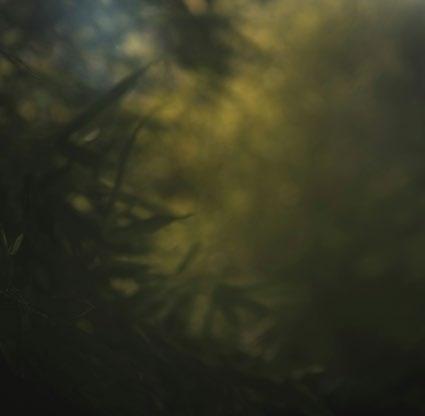


Ambassador is published bi-annually by MST-Eastern College Australia, 5 Burwood Highway, Wantirna, VIC 3152, Australia. ABN:58 004 265 016. All rights reserved. Copyright 2024. FACULTY NEWS 18 Master of Transformational Development Tanya Riches 19 Education Faculty Avril Howard 20 Student Services Daisy Barnard 20 Counselling Faculty Julie Morsillo ALUMNI & FRIENDS 14 Alumni Focus 22 Farewells 26 Vale Cornelia Tyrrell & Rev Dr Harold Taylor Tim Meyers 27 Alumni News 6 Can we Make a Project of Building Resilient Faith? Katherine Thompson 7 What’s Happening in the Youth Mental Health Space? Katherine Thompson 13 Q & A with Dr Avril Howard 15 Introducing Dr Andrew Brown’s new book: Recruiting the Ancients for the Creation Debate 8 Snapshots from the Reformation Tour Pre P ared by the a mbassador t eam Outer plastic wrap is made from biodegradable material. Melbourne School of Theology Address 5 Burwood Highway Wantirna VIC 3152 Australia Phone + 613 9881 7800 mst.edu.au Eastern College Australia Address 5 Burwood Highway Wantirna VIC 3152 Australia Phone + 613 9790 9200 eastern.edu.au Amb A ss A dor | Issue 236 4 Taking His Yoke CENTRES OF EXCELLENCE 21 Centre for the Study of Chinese Christianity Justin Tan 17 Arthur Jeffery Centre for the Study of Islam Denis Savelyev 16 Centre for Theology and Psychology Michael Bräutigam SUBSCRIBE TO, OR UPDATE YOUR AMBASSADOR MAGAZINE SUBSCRIPTION Go to mst.edu.au/ambassador to subscibe and receive two issues of Ambassador Magazine every year for free! You can also use this link to update your subscription. Melbourne School of Theology is authorised to deliver courses for the Australian College of Theology ABN: 58 004 265 016 CRICOS: 02650E ACN: 004 265 016 Eastern College Australia ABN: 61 551 855 405 ACN: 641 764 785 RTO No: 22065 HE No: PRV12149 CRICOS: 03853H 24 A Family Tree Bearing Many Fruits: Three Generations of Mission and Alumni PHOTO: FRONT COVER: REMUS YIP, MST AUDIT STUDENT
TAKING HIS YOKE
In m atthew 11:29, Jesus says, ‘Take my yoke upon you and learn from me, for I am gentle and humble in heart, and you will find rest for your souls’ (NIV). Many know this scripture for the promise of rest and offer of a shared load, yet to learn from Him has proven instrumental for many Melbourne School of Theology and Eastern College Australia (MST-ECA) students in receiving the greater loveliness of Christ’s invitation in this verse.
Daisy Barnard, our Dean of Students, shared with Ambassador recently about the complex lives our students navigate whilst studying.
For school-leavers who are young, life tends to be loaded with church commitments, sport commitments, parttime jobs, family, and study, and they feel like most of their day is driving between demands. The majority of our non-school-leaver [students] are around their mid-thirties, and leading (or heavily involved in) church groups, working, running busy households with kids and a variety of adult roles and responsibilities.
The college also boasts a vast number of international and remote students, often facing many of the abovementioned complexities in addition to adversity borne out of disadvantage by circumstances, language barriers, demographic or environment. For any of those student groups, the load
is heavy. It is wearying. Sometimes, too much. But there is a gracious saviour promising a lighter load if they would share it with Him and learn from Him. We hear from two students who associate their learning from Him directly with an inexplicable ease in their lives: Nathan was not a believer. He prided himself on intelligently rejecting the Holy Bible, and “anything to do with God and His followers.” A social worker

by profession, Nathan was committed to a greater good. He cared deeply for the welfare of others and loved his family.
In pursuit of social justice, he ran for local government with a vehemence for change.
The problem was that I doing these things wholly in my own strength. At around the same time, an amazing woman and neighbour had started to share her faith with me, and I had begun to hear it. I had a Bible and was reading it, perhaps sceptically above all else in the beginning. Meanwhile things at home for me were strained and my marriage was struggling. I was very new to the Christian faith but the barriers from believing were starting to move.
One day, my wife and I separated. At that exact time of separation, I felt a conviction and rush of comforting love from the Holy Spirit pour straight into my heart. It was as though He was protecting it from breaking, and I knew I couldn’t share my heart - designed for love and worship - with the glorification of anything else, or any false gods in this world. I quit politics almost on the spot and allowed Jesus into my life.
Despite his marital heartache, Nathan embraced his new faith. On a Christian retreat in Wantirna (the same suburb as the college), he felt called to go to Bible school and learn more. Searching for a Bible school on his phone, MST-ECA happened to be in the same suburb as he was at the time.
When I arrived at the college and walked through the front doors, I just felt like I was home, in the right place according to God’s will for my life. So I enrolled in a Master of Ministry, and 2023 was my first year.
For Nathan, life is complicated, navigating time with his children, sadness from his marital separation and running a business in a service industry he had started “to keep busy instead of wallowing.” A new study load on
4
LEFT PAGE, BOTTOM RIGHT: NATHAN LESSLIE
PHOTO:
“I GENUINELY DID NOT KNOW HOW I WAS GOING TO PUT FOOD ON THE TABLE”

top of those things could easily create overwhelming burden, but for the grace of God:
It’s as though I’m renewed as I learn more about Him, as I dig deeper into His Word, and I have gained such a sense of family in this environment, that I know beyond a doubt the Lord is blessing me.
Daisy says weekly Chapel services bring this sentiment out. “Stopping classes to attend chapel and hear a message from Scripture together is a unifying and uplifting thing. Students often reflect that the message was exactly what they needed to hear, and many times, reflect on how they see the Lord’s hand in the way their class discussions align with the chapel message that day.”
Angela was amongst those students relishing the Chapel services.
I was a born-again Christian who had been baptised in 2017. Having said that, I was living with a crippling sense of fear and persecution, in the aftermath of a difficult situation that left me in pieces, as well as oppressed financially, emotionally and physically. My faith in Christ had led me to take a service job as a Teacher’s Aide at my son’s school. A colleague and past teacher of mine intersected my path one afternoon and suggested I would make a great teacher and pointed me straight to Eastern College Australia.
Upon her enrolment, however, Angela faced more difficulties.
There were several times where I genuinely did not know how I was going to put food on the table. I was under so much financial pressure in addition to the ordinary expenses of raising a child. I had unexpected legal fees, received no Child Support payments… It made studying seem impossible at times. My parents were worried how I would juggle parenting, work and study. To be honest, it was mustard-seed faith at the outset and there was a time in the first few weeks where I thought I would withdraw. Thankfully, I did not.

quick reply. Angela completed her Master of Teaching at the close of 2023 and was among the ECA graduates in the Graduation Ceremony in late March. Daisy reiterates the victory in each student graduate, regardless of their course, at the Graduation ceremonies, as being much more than academic accomplishment. She should know:
Feeling so vulnerable, did Angela feel ostracised from the college community?
It certainly took time for me to fully trust others, but in each session [seminars and lectures] it became clear that God was moving mountains in my heart and mind. I have formed so many dear friends as a result of my decision to study. Even though our circumstances are different, I never felt judged by any of them, only supported.
With courses in teaching available in most universities, Ambassador asked Angela if she could have studied anywhere else. “Not a chance,” was her
Reflecting on nearly a decade within this college community, I see how the Lord has worked in my life. I remember sitting in my car to eat lunch, too afraid to get involved, to now having the honour of leading in various ways. Similarly, for our graduates, their journey is about more than just academic achievement; it’s also about personal growth and deepening their faith.
Fortunately, for college students graduating, time in the college community does not cease. There is always an active alumni life to embrace afterwards...
Daisy Barnar D is the Dean of Students for MSTECA. n a T han Less L ie is a social worker and the director of Fair Go Gardening Services, and is serving on the college Student Representative Council in 2024. a nge L a (not her real name) began her career as a teacher in 2024. This article is written and comprised from testimonies by the Ambassador editor.
5
PHOTO: RIGHT PAGE, TOP: MORNING TEA AFTER CHAPEL ◉ PHOTO: RIGHT PAGE, MIDDLE: UNSPLASH ARTEM KOVALEV
Can we make a project of building resilient faith?
BY DR KATHERINE THOMPSON
The Resilience PRoject Is a book based on a popular wellbeing program used in schools and workplaces in Australia. The book says it is about “finding happiness through gratitude, empathy and mindfulness”, and does this through story and by outlining some very practical strategies that can be implemented into our daily lives to create meaningful change.
On one level I thought the book presented a very reasonable approach to improving wellbeing and mental health for the average young Australian. But I wondered why Christians don’t contribute in this area? And, what would the principles of gratitude, empathy and mindfulness (GEM) look like in light of our faith? Perhaps the equivalent might be thankfulness, love and contemplation (TLC).
Thankfulness
The Psalms are a great example of what thankfulness might look like. By regularly reading the Psalms, or telling God some things we are thankful for each day, we can transform our perspective. We can expect that if we practise this as a spiritual discipline, it is going to have the same positive mental health benefits as practising gratitude.

Psalm 100
Shout for joy to the Lord, all the earth. Worship the Lord with gladness; come before him with joyful songs. Know that the Lord is God. It is he who made us, and we are his; we are his people, the sheep of his pasture. Enter his gates with thanksgiving and his courts with praise; give thanks to him and praise his name. For the Lord is good and his love endures forever; his faithfulness continues through all generations.
Love
Love is the essence of the Christian gospel and the way of Jesus Christ. Jesus said the two most important things in life were to love God and love our neighbour with everything we have (Mark 12:30-31). It’s not an ideal so much as something we choose to do. It is about putting into practise the aspects of love so we are living them out with the people around us. Try replacing the love is with the personal pronoun I am: I am patient and kind. I do not envy or boast. I am not proud. I do not dishonour others. I am not self-seeking, or easily angered. I do not keep a record of wrongs. I do not delight in evil but rejoice with the truth. I always protect, trust, hope and persevere (1 Corinthians 13: 4-7).
Contemplation
Contemplation is about spending time with God, meditating on creation or scripture, or sitting in silence. It is focussing on God and ourselves through prayer with a view to becoming more like Christ. It is accepting Christ’s peace as he offers to give it to us. Jesus said: Peace I leave with you; my peace I give you. I do not give to you as the world gives. Do not let your hearts be troubled and do not be afraid (John 14:27).
Build Your Resilience
Why not ask yourself:
– What 3 things can I thank God for today?
– What is one act of love I can do for another person right now?
– How can I take 10 minutes to sit quietly and contemplate God’s presence?

Dr Ka T herine Thompson is a Senior Lecturer in Youth Mental Health and Wellbeing at Melbourne School of Theology and Eastern College Australia. She is a youth mental health specialist, accredited Mental Health Social Worker, academic, researcher and author of Christ-Centred Mindfulness and The Discipline of Suffering.
6
What’s happening in the youth mental health space?

Most people experIence theIr first episode of mental illness between the ages of 12 and 25 years, and 36% of young people turn to a teacher and 30% turn to a school counsellor for help. This places Christian secondary school teachers, chaplains, and wellbeing staff in a unique position to reach out and offer effective support.
This is why Eastern College Australia has developed new faith integrated youth mental health and wellbeing courses that are designed to better equip Christians who work with young people. These new courses are a perfect professional development opportunity for staff at Christian secondary schools.
We have three tiers of postgraduate courses on offer: Graduate Certificate (4 units), Graduate Diploma (8 subjects), Masters (12 subjects). They can be completed full-time or part-time, online via Zoom or in-person – the choice is yours. They offer a mixture
of intensives, evening workshops, and Saturday classes. We take students from across Australia, and you can start your study in either semester 1 or 2.
The first 4 subjects of our Youth Mental Health and Wellbeing courses cover important topics such as: – youth mental health - anxiety, depression, substance use, mental health first aid, suicidality and self-harm
– identity development and neurodiversity – wellbeing and positive psychology – complex issues like sexuality, abuse and family violence
It encourages the building of advanced skills to work with young people who experience these issues, while informing this with a faith perspective.
If you want to go further in your study, the Graduate Diploma and Masters provide more in-depth exploration of:
– theology of mental health and wellbeing
– therapy skills - brief interventions, positive psychology and acceptance and commitment therapy – research skills - Masters only
This course is unique because it is the only one of its kind in Australia: bridging faith, mental health and wellbeing. Why not sign up for a post graduate course in Youth Mental Health and Wellbeing at Eastern College Australia? Be great at your job!
You can email Student Services for further information, info@eastern.edu. au, or check out this website, eastern. edu.au/ymhw
7

1
Wittenberg
Martin Luther lived most of his life in Wittenberg. After the monastery was dissolved, its building was given to him to be his home. The Schloßkirche where Luther preached is part of the university where he lectured theology. This is the doorway that once framed the door to which he nailed his Ninety-Five Theses.
“Luther was awarded his doctorate (1512) within the church. He is often portrayed as ‘one of the people’ yet, in reality, he was a very learned man.” (Tanya)
“Luther’s legacy is more than just an empty building but extends to the lives of Christians in Germany even to this day. The Schloßkirche is still used every week by an active church community.” (Tayla)
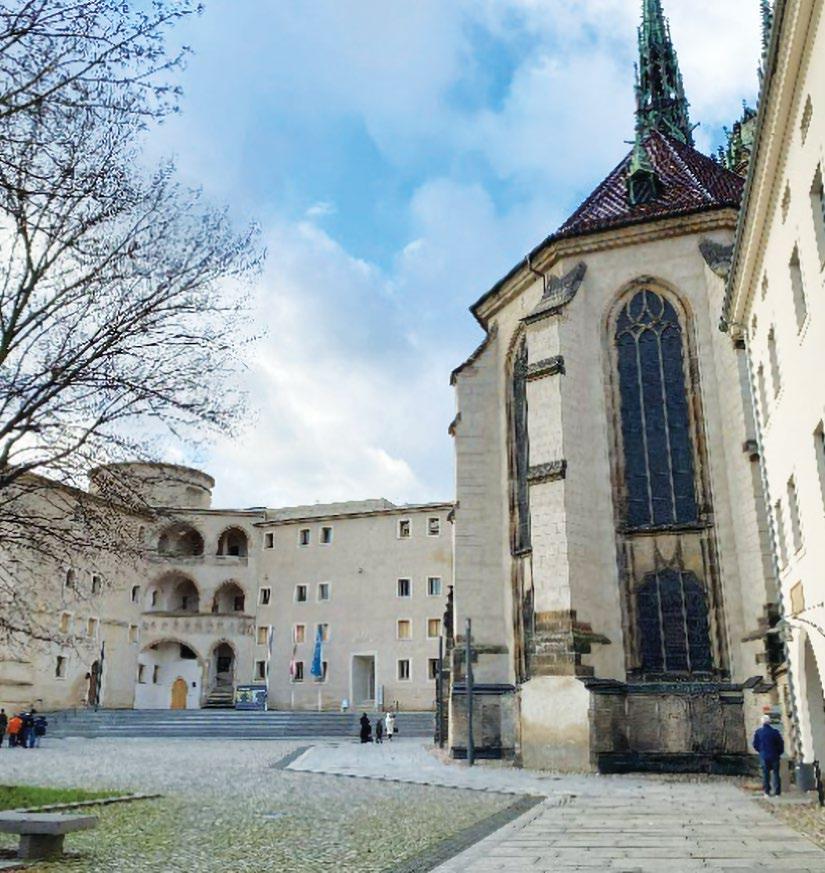
Snapshots FROM THE Reformation Tour 2024
ow do you bring history to life? Thirty-four participants joined the Melbourne School of Theology (MST) Church history unit in Berlin on 21 January. We travelled south-west on the trail of the Reformers, seeing what they saw, hearing what they heard and often feeling what they felt. The lesson of many Reformation museums is that the Reformation is no museum piece: it is alive in evangelical communities throughout the world to this day.
2
Eisleben
Luther was born and died at Eisleben but on both occasions he was only visiting.
“Even though Luther’s birth and death houses were not the originals, they still gave me a good taste of what life might have looked like in the 16th century. Instead of heaters, they kept the rooms warm with big wood-fired stoves that radiated heat through the whole house. And they played games like marbles just as I did when I was a child.” (Tayla)

8
1. WITTENBERG ALL SAINTS’ CHURCH 2. MARTIN LUTHER HOUSE IN GER EISLEBEN
1. WITTENBERG DOOR
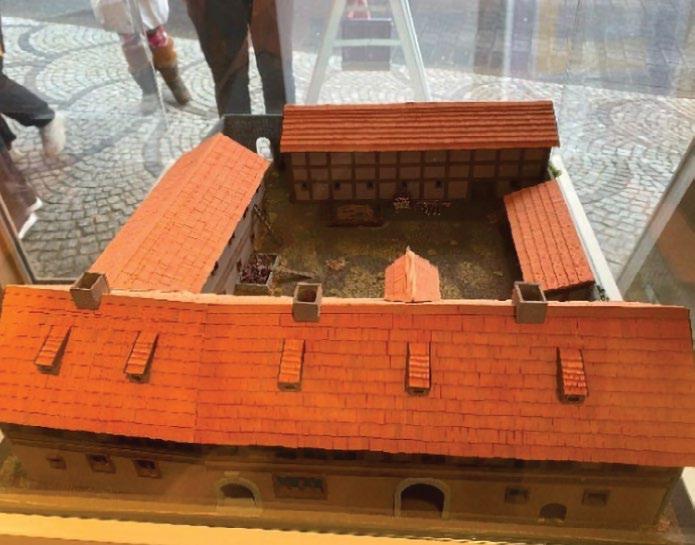
3
Mansfeld
Luther spent his childhood at Mansfeld and went to school there. We saw a museum featuring some of his childhood circumstances.
“Further misunderstandings and misconceptions debunked … Luther came from a wealthy middle-class family rather than a childhood of poverty.” (Tanya)
4 Erfurt
At Erfurt we lodged in St Augustine’s Monastery, where Luther first took his vows.
“As we reached the gate, I wondered where we would sleep. Then it struck me that in 1505 Luther reached the same gate, wondering where he would sleep.” (Peter) (Luther slept in the upper room on the right. We slept in rooms behind the wall on the left.)
“I loved being able to experience being in the same places as Luther and entering into the same rooms. [In the chapter-house] were explained some of the rules Luther had to abide by, including not making a sound or falling asleep. It was also a room for confessions of wrongdoing where monks are given opportunities to confess any sins from during the day/week that ranged from serious infringements to small thoughts.” (Tanya)
Luther studied law at Erfurt, and we saw some of the university buildings. The city is ravishing. Several students said, “It was worth coming to Germany just to see Erfurt!”
5
The Wartburg
Condemned as a heretic, Luther sheltered in the Wartburg for 300 days.
“It was amazing to see Luther’s room in the Wartburg castle and imagine him working there. It took me so long to translate even a couple of sentences from Greek, so it was astounding thinking of the amount of work it required to translated the whole New Testament up in that castle.” (Tayla)
However, the Wartburg already had a long history. It was built in the eleventh century as an impregnable citadel.
“What impacted me the most was the story of St Elisabeth and the sheer dazzling room built in her honour. Married to Ludwig IV of Thuringia at fourteen and widowed at twenty, she followed an ascetic movement that was harsh and severe. She built a hospice in Marburg and spent her last years caring for the poor and sick there.” (Tanya)


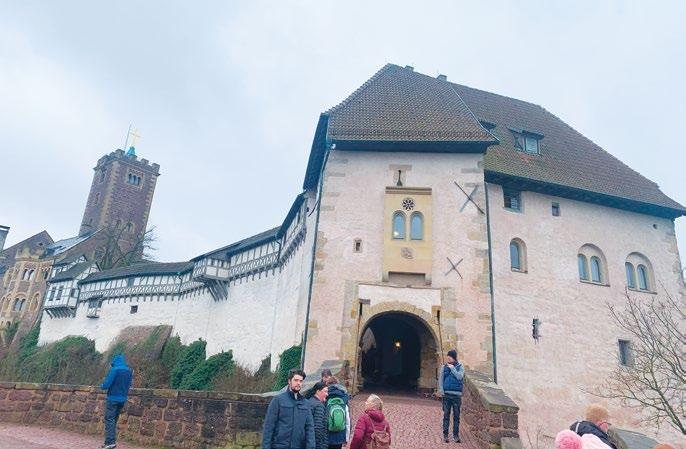
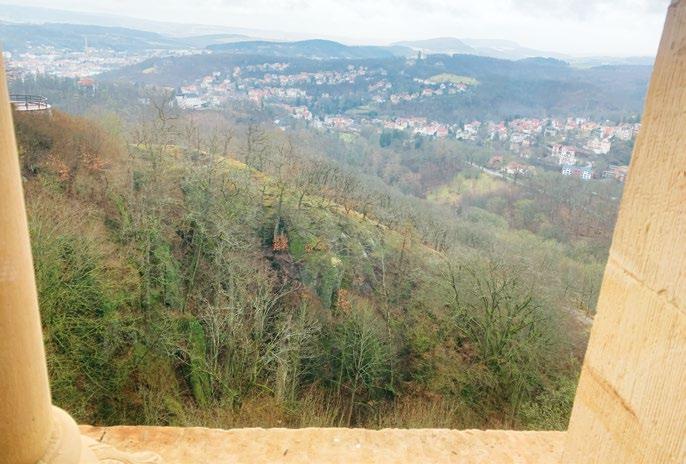

6
Eisenach
Eisenach is where Luther attended school as a teenager.
“Despite the apparent wealth of Luther’s parents, he had to earn a living at the school. He would go from house to house as a choirboy to earn money.” (Tanya)
“Luther’s childhood seems to have been miserable. In Eisenach he survived because of the empathy and practical help of the Cotta family. By reaching out to a hitherto unloved youth, I wonder how many psychological wounds they healed. Perhaps the Cottas’ kindness changed the course of history.” (Diana)
J. S. Bach also spent his childhood in Eisenach and he also worked there as a choirboy. His music was influenced by Luther’s theology.
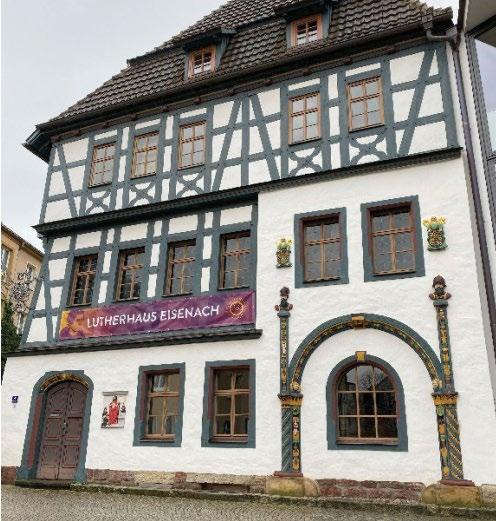
9
5. WARTBURG DEFENDERS’ VIEW
5. WARTBURG MEMORIAL TO ST ELISABETH
4. ERFURT MONASTERY
6. EISENACH COTTA FAMILY’S HOUSE
4. ERFURT CHAPTER HOUSE
3. MANSFELD MODEL OF LUTHER’S PARENTS’ HOUSE
5. WARTBURG ENTRANCE

7 Mainz


8
Host Families in Simmern


10
In Mainz we visited the Gutenberg Museum and learned about printing.
“This was a real highlight for me. I loved getting to watch our tour guide use a real printing press in front of us. He explained that the printing press was built using a combination of Roman wine press technology and Chinese block printing. I read so many books every year and it’s so easy to take for granted just how accessible they are now. Before the invention of the printing press in the 1430’s-40’s books were copied by hand. The fact that books could be mass produced by the time Luther was around was a key ingredient to the spread of the Reformation.” (Tayla)
“You cannot get more ‘Reformation Tour’ than printing your own indulgences.” (Tanya)
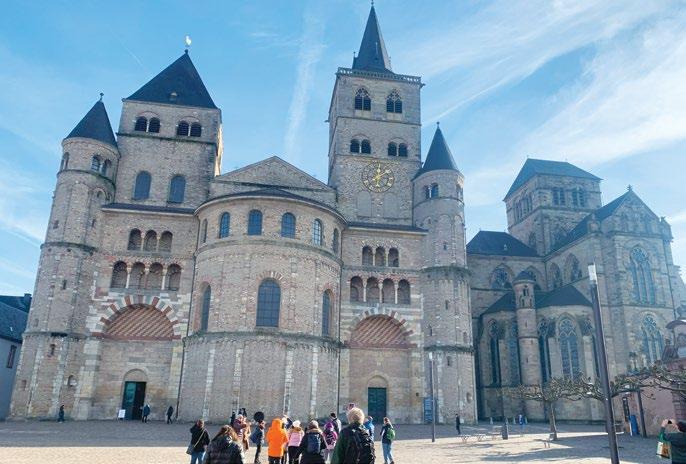
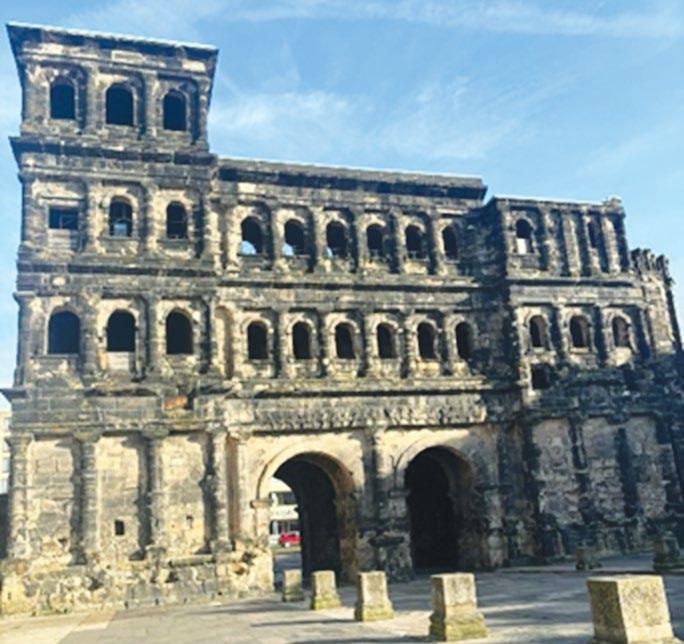
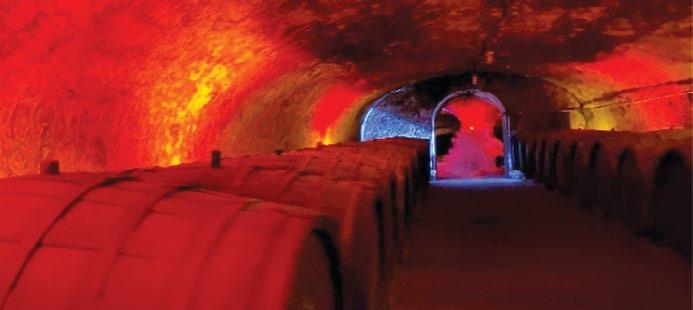
This day was spent with host families. We attended morning church with them, then walked in the Soonwald in the afternoon. This was a chance to witness the ongoing impact of the Reformation in the lives of German Christians.
9 Trier
Trier was founded in the time of Augustus. Trier Cathedral, with a fourth-century foundation, is the oldest church in Germany. Constantine’s Basilica was the Emperor’s throne-room but it is now an evangelical church with a huge organ.
“It felt surreal to be able to touch the very stones that Constantine touched and to enter buildings that are likely to have existed in some form during the time of Jesus.” (Tanya)
“I’d never heard of Caspar Olevianus before the tour. It was so immersive to hear about him in his own city. Aside from the Heidelberg Catechism, his main legacy is that he got to work and put reforms in place.” (Tayla)
“Our group ate dinner at a local church in Trier and it was lovely to be able to sing worship songs with our German brothers and sisters in Christ and talk to them about God.” (Tayla)
“We had a private wine tour of Roman cellars. We sampled the white wines of the area grown using Roman traditional methods. We also heard of the illegal raves that occurred underground during the COVID lockdowns and damaged some of the old wine caskets.” (Tanya)
Strasbourg
John Calvin spent three years in Strasbourg before his permanent move to Geneva. During this period he was mentored by Martin Bucer, who exerted a moderating influence on Calvin’s notorious stubbornness. Bucer is not the most famous Reformer, but he had a long impact. He also influenced Melanchthon, and he invented home groups.
Strasbourg has the quintessential Gothic cathedral.
“The lighting gives the whole building a mysterious air. Those windows were designed to deliver a message!” (Robert)
“Now I understand the point of all the grandeur and ornamentation of those old cathedrals: to reflect God’s glory and draw people closer to him.” (Tayla)
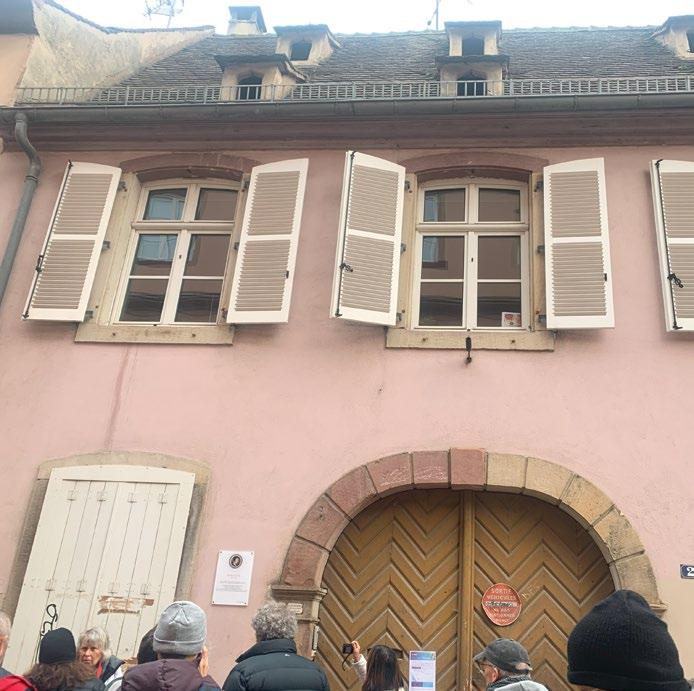

10
7.
PRINT YOUR OWN INDULGENCE
7. MAINZ GETENBERG BIBLE
MAINZ
10. STRASBOURG INSIDE THE CATHEDRAL 10. STRASBOURG CATHEDRAL ROSE WINDOW
8. SIMMERN SOONWALD
9. TRIER CATHEDRAL
9. TRIER PORTA NIGRA
9. TRIER ROMAN WINE CELLAR
10. STRASBOURG CALVIN’S HOUSE 10. STRASBOURG
Eternity
a
poem by Gina Marie
I reach out and touch walls long-standing Ancient, Roman-built walls
Red brick, held together
Past fortifiers
Past shields from the elements
Past spaces of ceremony and life
The tormented toil of those whose personal agency was taken from them
Battle scars
Rough edges
Smoothed surfaces
Times and places where souls moved, and lived, and died
And now…here I stand…my hand on a wall…and I feel, in this moment, that the timelessness of eternity that I long for…is indeed tangible.



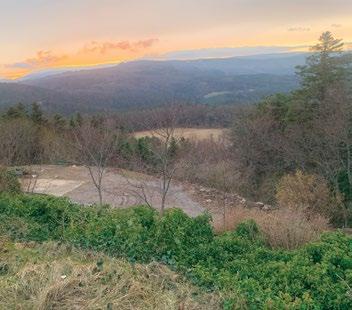
11
Ottrott
At Ottrott we stayed at St Odile’s Catholic monastery, which is perched in the heights of Alsace. It is a working monastery that requires silence in the corridors. We were allowed to pray in the chapel.
“By spending time in “quiet” prayer, I realised that as a group we were not that quiet. Even though we did not speak, there was movement and sound as people came and went through the door and took off/put on jackets. This made me wonder whether the traditional monk’s habit allowed people to move soundlessly.” (Tanya)

12
Colmar
“The crown jewel of the Musée Unterlinden is the Isenheim Altar-Piece. Not only is it visually stunning but it depicts the Biblical story so clearly. It also illustrates religious traditions not in the Biblical canon such as the story of St. Anthony. It featured goblin-like creatures obviously meant to represent evil forces, which gives us a window into the sixteenth-century worldview. People were probably unconsciously combining cultural mindset and folklore with the stories they heard in scripture.” (Tayla)
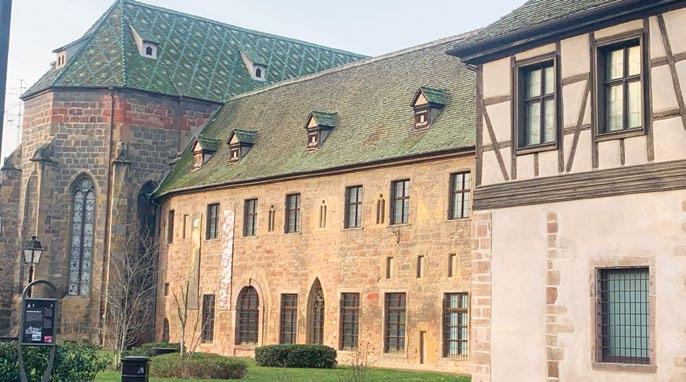
11
TOUR SNAPSHOTS ORGANISED AND EDITED BY DIANA SUMMERS. DIANA SUMMERS IS A PHD CANDIDATE AT MELBOURNE SCHOOL OF THEOLOGY.
Images from Trier,
29/1/2024 1/2/2024 (Reformation Tour – written in
11. OTROTT MONASTERY OF ST ODILE + VIEW 12. COLMAR MUSEE UNTERLINDEN ALTAR-PIECE 12. COLMAR MUSEE UNTERLINDEN
Gina Marie – Pondering Vision
Basilica
Konstanz)

13
Konstanz
This is where Jan Hus was burned at stake in 1415. A building from that period now houses a museum about his life.
“Hus’s real crime was to preach the Reformation a century before it happened. However, Czech schoolchildren during the Cold War were taught that Hus was a hero because he was the first Communist!” (Diana)
“We were staying in the buildings of the monastery that was Jan Hus’s first prison before he was eventually burned outside the city walls. I had not realised that he was credited with creating the diacritics for the Czech alphabet. As a literacy worker, I was fascinated to read about his passion for his congregants to understand biblical truths in a language they understood.” (Tanya)
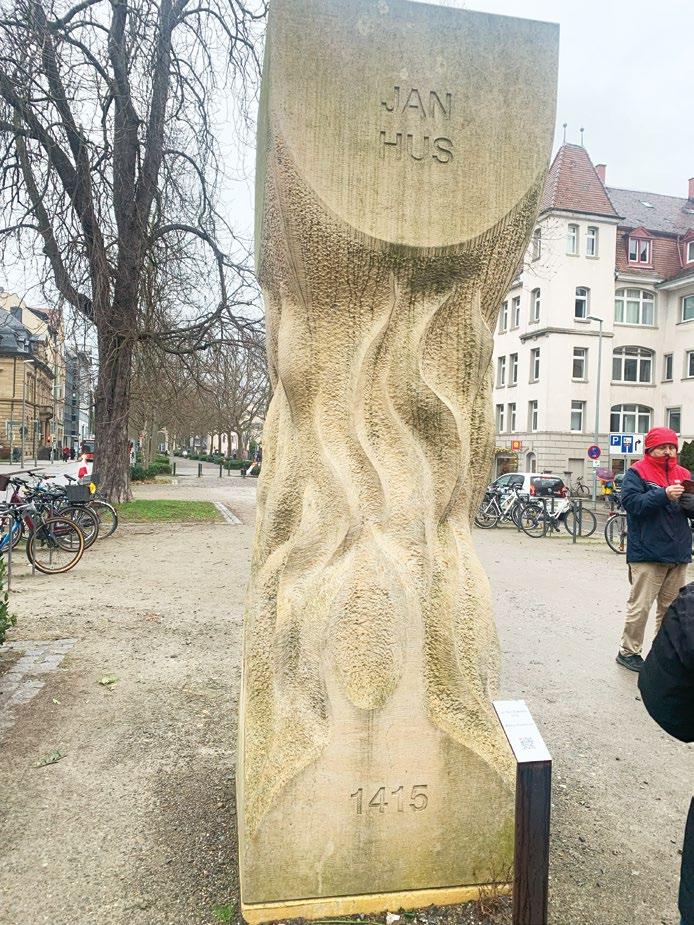
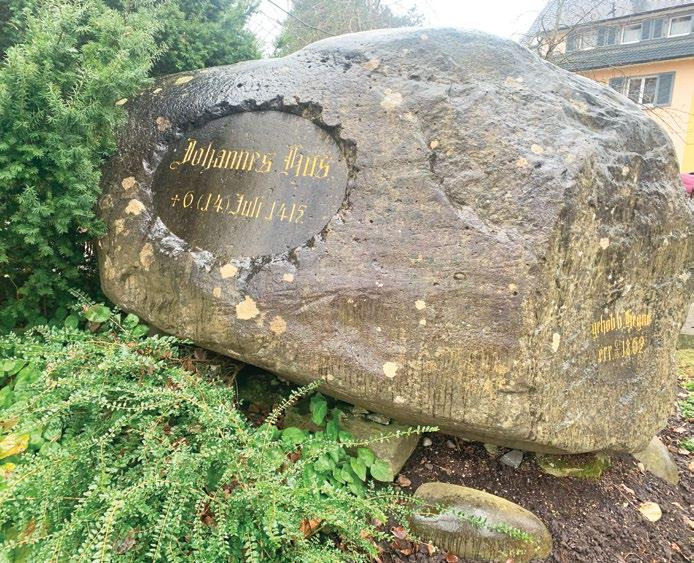
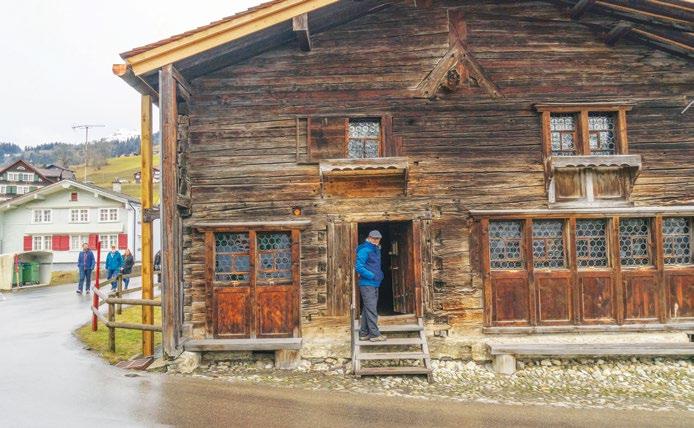

14
Wildhaus am Toggenburg
We stopped at Wildhaus am Toggenburg to see the house where Huldrych Zwingli was born and spent his early childhood.
“Zwingli’s house was his actual house, not a recreation of it. The whole time I was inside I was just imagining it bustling with life. Zwingli and his parents and his many brothers and sisters spent their days there, climbing the same steps I climbed, standing by the same fireplace I stood around … I found beauty in its simplicity. In the end, the Reformation was not about big buildings, but the Holy Spirit working through faithful Christ-followers in seemingly mundane ways that ultimately resulted in incalculable change.” (Tayla)


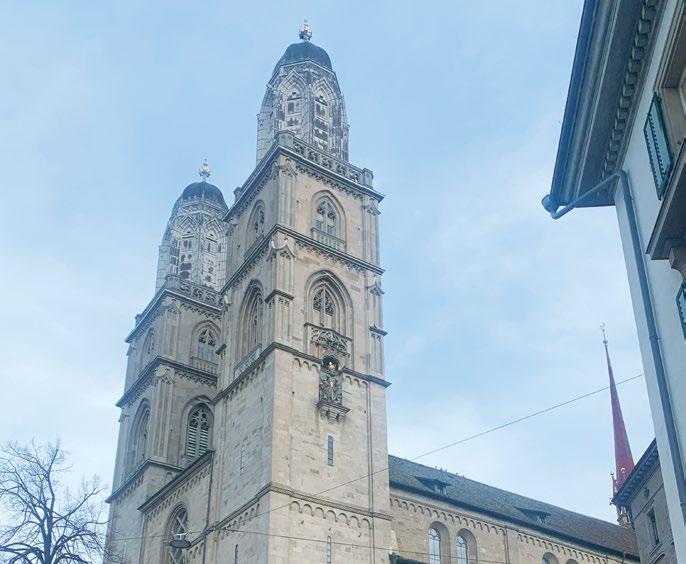
15
Zürich
In Zürich we followed Zwingli’s trail, including his printer’s house, where the Lenten sausages were eaten, and his church, where he organised the welfare state. We also saw the river where Felix Manz, the first Anabaptist, was drowned.
“Zürich opened my eyes to the diversity of the Reformation. While Luther was in Germany, Zwingli was faithfully reading scripture and enacting reform in Switzerland. God’s word and Spirit were not confined to one place but spread throughout all Europe and all the world.” (Tayla)
“Zwingli read and taught from one chapter of the Bible each week so that the people could access and learn from the Bible translation themselves. The Reformers were willing to give up wealth, status and even their lives for people to have access to the scriptures for themselves. As a literacy worker myself, I find a very deep connection to the work of the Reformers at this point. In them that I find encouragement and an example to follow when facing challenges and opposition.” (Tanya)
12
Snapshots written, edited and collated by Diana Summers. Diana is a PhD Candidate at Melbourne School of Theology.
14. VIEW OF SWITZERLAND FROM THE BUS
13. KONSTANZ HUS MEMORIAL
13. KONSTANZ HUS STONE
13. KONSTANZ FORMER MONASTERY, NOW HOTEL
14. WILDHAUS ZWINGLI’S KITCHEN
14. WILDHAUS ZWINGLI’S HOUSE
15. ZURICH PRINTER’S HOUSE
15. ZURICH MINSTER
Could you please share some of your background?
I was born and raised in South Africa, a country celebrated for its kaleidoscope of cultures. This has fostered in me a deep appreciation for multiculturalism and a respect for the heritage of all people. It has also helped me as an established Australian citizen to make a meaningful contribution to this pluralistic and beautifully diverse society through the Education sector.
What trajectories since your youth has your career taken?
My career in teaching started with me being a Sunday school teacher. I ventured into studying social work, but along the way, I felt a God-given call to make a vocation in Education.
I commenced my professional career as a teacher and over the course of time progressed to leadership, including being the Principal of a Christian school for about ten years. I’m currently a Board Director on Christian Schools Events Network (CSEN). My husband and I are involved in helping establish a Christian school in a remote Indigenous community called Napranum, in Queensland.
What is your academic history?
I have remained a life-long learner having completed a Bachelor of Arts; Bachelor of Education (Honours); Master of Education and Doctor of Philosophy (Education). I have also completed a Diploma in Business, attended Harvard Graduate School of Education, participated in an educational study tour to Israel, and had the privilege of studying Church History and Context through Melbourne School of Theology.
Could you share the nature and field of your Doctoral thesis?
My thesis investigated the Australian National School Chaplaincy Program (NSCP) to nurture the spiritual wellbeing of students. The study engaged Christian philosopher Soren Kierkegaard’s existential philosophy of spirituality to explore the perspectives of school chaplains. The findings indicated the potential of the NSCP in furthering national educational goals to promote spirituality in schools. One of the recommendations of the study
Q & A with Dr Avril Howard

was for governmental continuation of funding into this essential pastoral care program for all schools.
What is your role at Eastern College Australia (ECA)?
It is a joy and privilege to be the Dean of Education at Eastern College Australia and engage in what I enjoy most: bringing faith into the teaching and learning sector. My role is to lead the team of dedicated faculty and staff in delivering ECA’s Education courses (training pre-service teachers).
Do you have any goals for the future in your role at Eastern College Australia?
My main goal is to strategically respond to the national shortage of teachers. I am sowing into collaborations with all schools and stakeholders to produce a supply of high-calibre Christian teachers. I aim to raise up the next generation of young people with hope and purpose.
What are you enjoying most about your position at Eastern College Australia?
I enjoy leading and serving within a Christian tertiary institution, fostering a sense of community and collegiality among our dedicated faculty and staff.
Moreover, I take pleasure in creating an enriching Christian academic environment where our pre-service teachers can flourish.
What is your favourite Bible verse, and why?
My favourite Bible verse is: “Go therefore and make disciples of all the nations, baptizing them in the name of the Father and of the Son and of the Holy Spirit, teaching them to observe all things that I have commanded you; and lo, I am with you always, even to the end of the age” (Matthew 28:19-20). The instruction to ‘make disciples’ resonates with me as I love teaching, training and equipping Christians, especially teachers, through the Biblical worldview. I see this as a form of discipleship.
Who is your favourite biblical figure?
Many of the female Bible figures stand out as excellent role models but perhaps Esther has made the biggest impression on me, for her courage and selfless nature in ultimately saving a nation.
How do you prefer to spend your recreational time?
I love the time I spend with my husband and three children, enjoying good food and almond chai lattes together. I also enjoy taking my dogs on leisurely walks through nature. Swimming and reading are also some of my recreational pastimes.
What is your favourite food?
I enjoy seafood but my favourite part of a meal is dessert with chocolate!
What is your favourite animal?
I love dogs. We have two pet dogs whom we dote upon a great deal.
What was the first music album you ever owned?
I love music, and growing up, I enjoyed piano. I do also enjoy Country and Western music, and especially like Dolly Parton’s song, “Coat of Many Colours.”
Dr a vri L h owar D is the Dean of Education at Eastern College Australia.
13

Alumni Focus
Melbourne School of Theology, Bible College of Victoria, Melbourne Bible Institute, Tabor Victoria and Eastern College Australia comprise the alumni community. In 2023, we had the opportunity to celebrate with our alumni at the following key events:
In march 2023, Melbourne Bible Institute (MBI) alumni joined us in Chapel. Many of our MBI alumni were students in the 1960’s, thus joining us with over 50 years of alumni history, friendship and journeys serving Christ. Many current students commented on how greatly they were encouraged and strengthened by the alumni presence at this service.
In october 2023, Bible College of Victoria (BCV), and Melbourne School of Theology (MST) held their the first ever, BCV-specific alumni event, a formal dinner at Sky High, Mt Dandenong. It was an enchanting evening of reconnection, celebration and sharing.
In november 2023, the college held a special Saturday service for our annual all-in alumni & friends gathering (both colleges). The college was bustling with social activity as our alumni from diverse backgrounds discovered or strengthened associations with each other and enjoyed fellowship and chapel together.


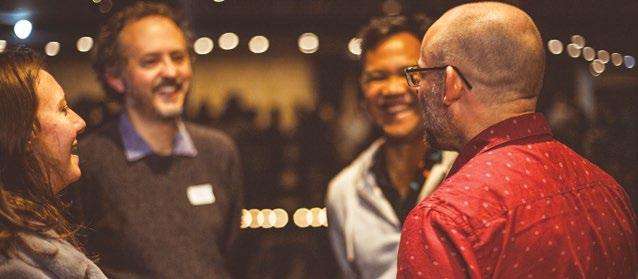

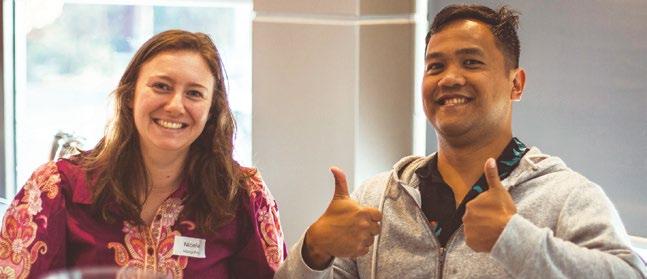
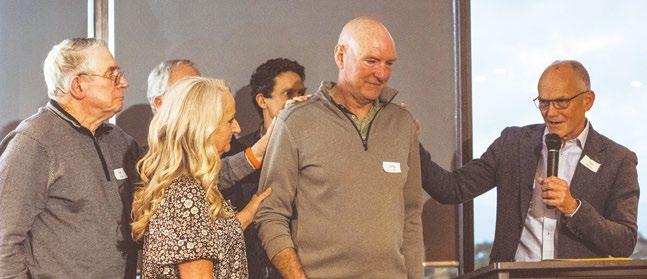

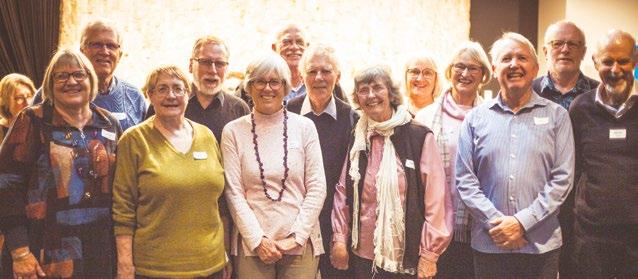
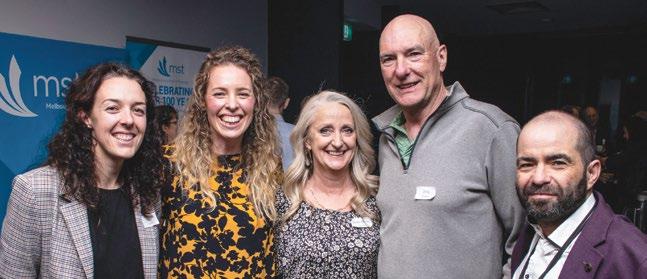




14
Introducing Dr Andrew Brown’s new book Recruiting the Ancients for the Creation Debate
You m I ght have heard of a recent trend in the church: ‘theological retrieval.’ It is devoted to rediscovering and reappropriating the thought and spirituality of the early church. For our sector of the church, sometimes forgetful of the legacy of the church’s spiritual giants, this has been a much-needed shift of attention. A tragic shallowness can result from consulting only living Bible commentators in order to understand our Bible. We hear this warning in recent clarion
The problem lies in trying to force ancient authors into contemporary boxes, as Andrew J. Brown shows in this thought-provoking volume. Covering Philo, Basil, Augustine, Thomas Aquinas, Martin Luther, John Calvin, John Wesley, and more, Brown carefully outlines great thinkers’ readings of Genesis in their intellectual contexts. He then assesses how these authors have been subject to cherry-picking and misappropriation in the trenches of the modern creation debate.

“A TRAGIC SHALLOWNESS CAN RESULT FROM CONSULTING ONLY LIVING BIBLE COMMENTATORS”
calls such as Ronald Heine’s Reading the Old Testament with the Ancient Church (Baker, 2007).
Yet is it possible to misuse ancient Christian examples of theology, spirituality or Bible interpretation. This misuse is identified in the title of my new book, Recruiting the Ancients for the Creation Debates. In the quest to solve a front-page biblical question, “How literally are we meant to take the creation week of Genesis 1?”, advocates for young-earth creation, theistic evolution and other debate positions can fall into the temptation to grab a handy catchline from their theologian of choice without fully understanding (or even reading!) the larger work that produced it. Eerdmans’ flyleaf summary explains:
By studying the intellectual history of the church in this way—to revisit rather than recruit the ancients—we can enrich our own biblical interpretation. Irenic and magisterial, Brown’s guide will interest both scholars of historical theology and anyone invested in the creation debate.
We could describe the immediate concern as historical but the benefits as biblical. Yes, we can learn from the great biblical interpreters of the past, as uncomfortable or unfamiliar as they sometimes seem. The names of these past saints are still famous for a reason. They have stood the test of time. They were deep. They were people of God. Despite their prejudices and personal conflicts, they knew God personally, and this living faith emerges in their writing.
I have written Recruiting not simply to debunk superficial cher ry-picking of Christian history but to encourage genuine use of the history of biblical interpretation to inform our own views of what creation texts mean and to explore more deeply what is true about God, ourselves and our world and how we should then live in the light of that truth.

15
AUTHOR Dr a n D rew Brown is a Lecturer in Old Testament at Melbourne School of Theology.
Theology and Psychology
In a world where the pressures of our hectic lives increasingly impact mental well-being, our team at the Centre for Theology & Psychology (CTP) is seeking to serve our community with effective tools and skills that make a positive difference in our lives. What does it actually mean to thrive and flourish, and what is the role of our Christian faith in this endeavour? This is one of the key questions I am examining in an international research program on Thriving in Diverse Contexts in collaboration with my colleagues in the research group at the Centre of Theological Inquiry in the USA. I
am excited to see how this research will positively influence what we are offering in our training and teaching programs at CTP in the future. CTP is now almost turning four years young, and I am delighted that, thanks to your support and generosity, our centre is growing and serving our community with creativity and care. By way of an update, here’s what’s happening currently at CTP:
Earlier this year, Aaryan de Bruyn joined our team, and we are truly blessed to have him on board. Aaryan’s expertise and dedication are instrumental in our online activities and digital productions, among other things. Over the next twelve months, Aaryan and team will create and roll out a series of self-guided online courses that will be accessible to people across the globe. Free and paid online courses will be available, covering topics such as mental health care, leadership, personal self-care, resilience, and much more.
We are now halfway through our THRIVE leadership program, and it’s been a transformative journey for our participants so far. In this year’s cohort, 17 Christian leaders from church ministry, missions, and allied health services are exploring with our expert teachers what it means to lead with humility and effectiveness in our fast-paced world. For the first time, we are running THRIVE via the two newly ACT-accredited units, Personal Leadership Formation (PC082) and Community Leadership Formation (PC083). We are excited to announce that you can now register interest for our 2025 cohort, which will be led by Dr. Kirk Franklin and team. Your participation and contribution are what make our programs thrive, and we look forward to having you with us.
We have some more exciting learning opportunities lined up for the second part of this year: On Saturday, 6th July, we are hosting a workshop on a crucial topic, “Older People’s Mental Health” (9 am to 12 pm). Did you know that by the age of 55, 20% of people struggle with mental health problems, and this
number only increases as we age? As Christians, we have a unique role in supporting the elderly members of our community. But what’s the best way to do it? Join us as Professor KG shares valuable insights and strategies in this not-to-be-missed workshop.
We also plan to offer a fascinating webinar with Dr. Matt Jacoby, “Why Do You Doubt—Psychological Obstacles to Faith in the Modern World.” Matt will examine the contemporary mindset and its unique problems with religious belief in the modern world. You’ll learn about the dysfunctional ways many people try to ‘overthink’ faith and the spirals of doubt that keep many of us in a state of spiritual paralysis.
Later this year, on 26th October, we are co-hosting a full-day conference here at MST with ISCAST: Faith-Based Mental Health Care in a Changing World. Our speakers will examine some of today’s most pressing mental health topics from a faith-based perspective, including a Christian perspective on holistic mental health care, gender dysphoria, science and spirituality in clinical medicine, and more.
A lot is happening; the CTP community is growing, and we would love you to join us. There are many ways you can connect with CTP. If you are researching at the intersection of faith and psychology, feel free to join our CTP Fermentation Group. This group is for researchers looking to connect with one another to get constructive feedback on ideas and learn from each other’s work.
If you work as a mental health professional or are simply interested in psychology and mental health, feel free to join our Mental Health Fellowship, which meets about four times yearly. Our next Fellowship group is on 8 June, and Christine D’Souza will speak on “Domestic Violence in the Faith Community.” To get involved in our groups, simply send an email to ctp@mst.edu.au. Thank you for your interest in CTP and for considering partnering with us in this vital work.
16
Cen T re for
Dr m i C hae L Bräu T igam is the MST Academic Vice Principal, Director of the Centre for Theology and Psychology, and Senior Lecturer in Theology.
Faculty News
The mIddle east has a lengthy history of conflict. A Hamasled attack on Israel in October 2023 brought a swift escalation and global attention. In the light of these developments, the Arthur Jeffery Centre (AJC) ran a series of events looking at the history of such conflict and how it affects the people and parties involved in it. AJC is focusing on studying Islam from a Christian point of view and equipping the church to engage with the Islamic faith missionally, socially and politically.
Our first seminar, ‘Understanding Israeli-Palestinian conflict,’ featured Dr Bernie Power. Christians seem to be very divided on the topic of Israel and the land. Some strongly support Israel, claiming that the State of Israel is the fulfillment of the ancient promise to Abraham. Other Christians support the Palestinian struggle for freedom, based on concepts of social justice. Both claim to have biblical backing for their views. Dr Power elucidated these points of view and explored how can we respond as Christians. Approximately 1000 viewers from 27 countries participated in this live online lecture.
The second seminar focused on ‘How Current Middle-Eastern Conflicts Affect Local Churches.’ Whenever conflict breaks out in the Middle East, killing of Christians in other
nations can quickly follow. Dr Mark Durie and Elizabeth Kendall outlined how blowback from the Israel-Hamas war is endangering our brothers and sisters in Christ.
In February, AJC launched a podcast, with the initial three episodes delving into Hamas, examining its history, mindset, belief in victory, and the prospects for peace in the Middle East, featuring Dr Mark Durie and Dr Richard Shumack. In the most recent episode Dr Bernie Power interviews Evan Thomas, a Messianic Jew from Israel, discussing the impact of the ongoing conflict on local Jewish communities.
In March, Dr Bernie Power conducted a practical seminar titled ‘Storytellers: Bringing Muslims Home’. During the evening Bernie Power’s doppelgänger (a character named Mabruuk) demonstrated how we can share the good news of Jesus with Muslims in a non-confrontational and entertaining way, by employing storytelling reminiscent of Arab folk tales.
AJC continues to embrace Christ-centred ways to respond to global events.
Arthur Jeffery Centre
Dr Denis s ave L yev Lecturer in Islam and Arthur Jeffery Centre Administrator.



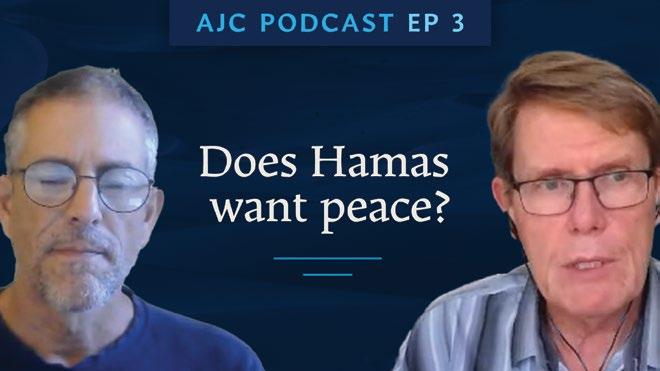
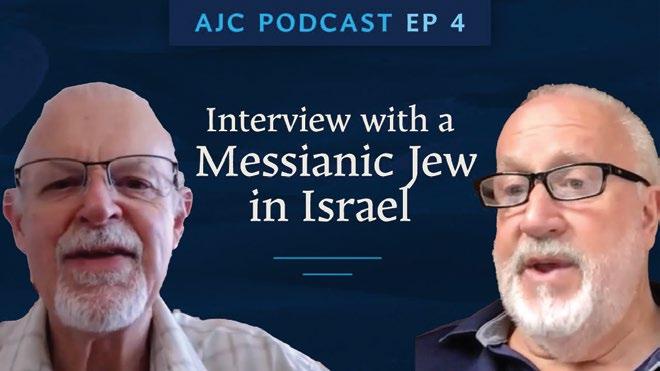
17 The
f or T he sT u D y of Islam
Faculty News
mst.edu.au/ajc-podcast
Watch or listen to the Podcast today!
Master of Transformational Development

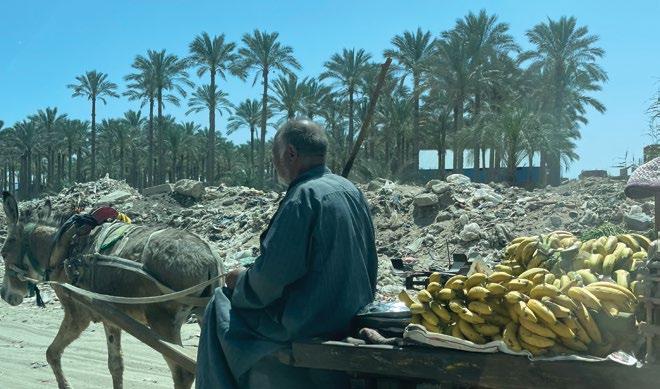




Streams growing for transformational development
Semester 1, 2024 has shaped up to be an excellent year for the Master of Transformational Development (MTD). In total, largely due to the generosity of Eastern College Australia’s donors, we now have 62 Masters students: 49 students in our “Economics, Development and Human Flourishing” unit with the rest finishing off their research project. These students come from all over the world (as in the table below in red). Additionally, for the first time, in 2024 we were able to accommodate 13 practitioners from International Justice Mission in Uganda in a tailored micro-credential, which adapted some of our content and allowed them space to explore “Biblical Justice, Human Rights and Advocacy.”
Due to increasing travel costs and the challenges for many students in the southern states of Africa since the pandemic, we have created a new Zambian “hub” from which our students now can gain access to the intensive.
We refocused our Steering Committees for effective contextualisation and transformational development in
the Australia/Pacific, MENA, Asia, and Sub-Saharan African regions. We are prayerful that the students’ applied conversations between peers, alumni, faculty, other thinking practitioners and scholars will contribute towards making a great impact against poverty in each of these contexts.
The MTD has continued to have an unprecedented number of applicants to the degree. This reflects the escalating need in various regions for a development-minded response to poverty and issues of marginalisation in the global church. There are already over 10 students awaiting a determination on whether they can join next semester’s cohort.
Please pray with us, that we can increase our donor base to accommodate the global demand, and if you would like more information, please feel free to reach out to our Student Services anytime on info@eastern. edu.au or at the Eastern College Australia offices.
D r T anya ri C hes Director of Master of Transformational Development.

18 Faculty News
Education Faculty
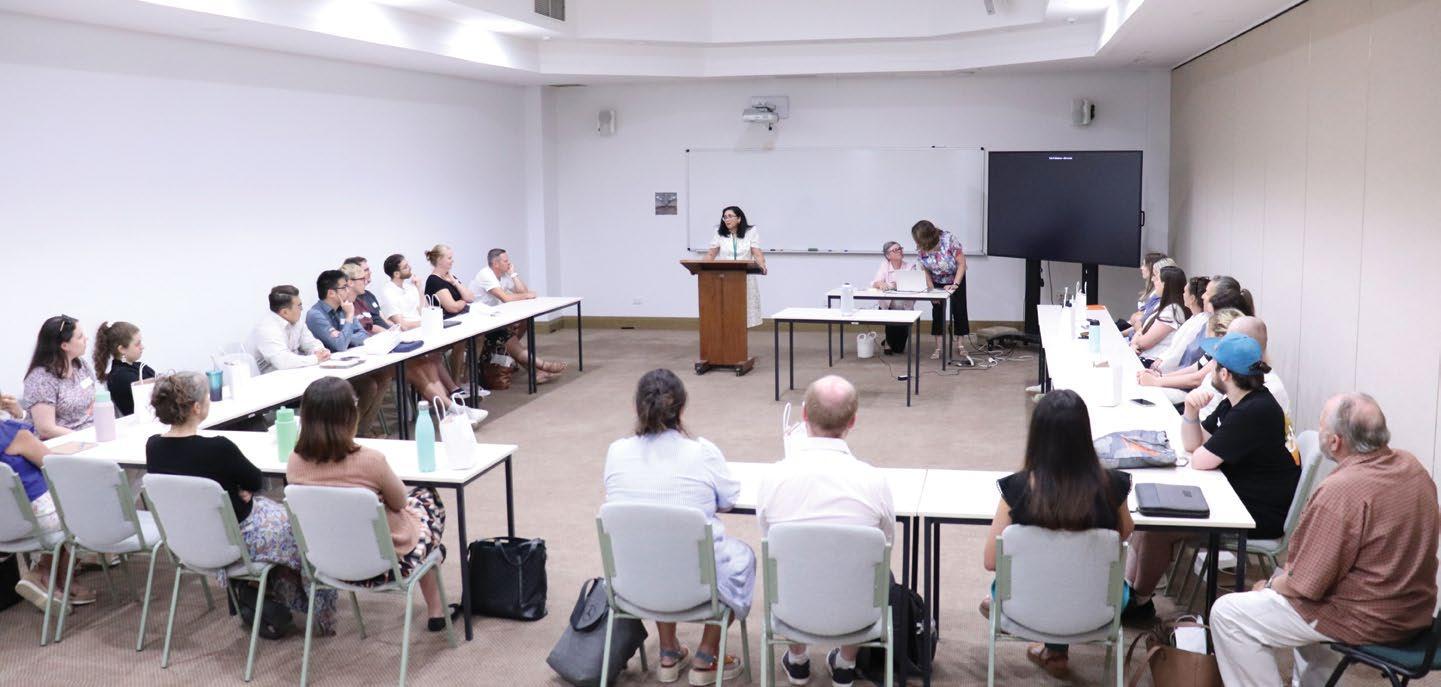
up in employment positions as new teachers is an added bonus!” (Rev Dr. Angelo Cettolin, Dean of Faculty).
Celebrating Educational Success
You crown the year with Your goodness, And Your paths drip with abundance (Psalm 65:11 NKJ).
At this time in the academic year, it gives me joy to reflect on the rich tapestry of experiences that have defined our journey as a team, ushering in a bright and promising future for teacher training. I’m delighted to highlight the Education faculty’s dedication and hard work. Their unwavering commitment to building a thriving Christian faculty has set the stage for remarkable success for the future of Pre-Service Teachers. We are proactively addressing the national crisis in teacher shortages. I trust you will enjoy reading some of the highlights of the previous year as expressed by our faculty and staff.
Faith and Teaching as Vocation
Shaping Teachers Today for Tomorrow
“WE ARE PROACTIVELY ADDRESSING THE NATIONAL CRISIS IN TEACHER SHORTAGES”
Initial Teacher Education (ITE) Coordinator, Tim Payze shares on how engaging with increased numbers of prospective students and teaching Educational Decision Making has been a joy for him. He comments the School of Education is thriving with a rapidly growing student body, “thanks in large part to our partnership with the Christian Initial Teacher Education (CITE) Alliance” presenting exciting opportunities to shape the next generation of pre-service teachers in their craft.
Employment-based Teaching Degrees and a vibrant community
Rev Dr Cettolin reflects on how the Education team triumphed over challenges, marking a significant highlight with increased enrolments for 2024. Leading students through the Integration of Vocation and Faith, he says, has been inspiring, witnessing their deepened theological understanding. The quote, “Your vocation in life is where your greatest joy meets the world’s greatest need,” (Frederick Buechner) encapsulates our students’ transformative journey. “Hearing that our future graduates have already been snapped
School Engagement Officer, Andy Callow, excitedly expresses how in the vibrant community of ECA, he has been warmly welcomed as a newcomer into a world of abounding acronyms, caring community members, and passionate professionals. He shares with joy how CITE alliance allies contributed to accelerated enrolments, through an employment based teaching degree program. “Laughs, levity, and a commitment to lifelong learning define our journey. I am excited to be part of this dynamic community.”
Education and Arts Student Support Officer provides a heartfelt description of how advocating for students facing adversity has been a blessing: “Witnessing their steadfast faith amid challenges is remarkable,” she says. Moreover, she conveys that the Education team’s “working relationships are special, operating not just as a well-oiled machine but with an extra blessing from the Lord.” The faculty retreat further nurtured our identity as a team, and she eagerly awaits celebrating the success of our students at their graduations and beyond.
Teamwork Makes the Dream Work
Education Administrator, Sue Grechko describes how joining the Education team mid-year 2023 has been a privilege. Witnessing the growth of the CITE Alliance and the team’s hard work has been truly wonderful she says. “The relationships within the team are a blessing, and it’s been a joy welcoming the first cohort of CITE Alliance students and future teachers [in 2024]”.
As we set our academic course for the new year, I praise God for His goodness and revelation of divine strategies to respond to the national teacher shortage crisis. I extend my heartfelt thanks to the entire Education faculty and adjunct lecturers, ECA faculty and staff for their invaluable contributions in training our future teachers. I also take this opportunity to again warmly welcome our current and new trainee teachers.
19
Ce L e B ra T ing g o D ’s g oo D ness in T he n o BL e p rofession of Tea C hing
SEMESTER 1 2024 ORIENTATION
Dr a vri L h owar D is the Dean of Education at Eastern College Australia.
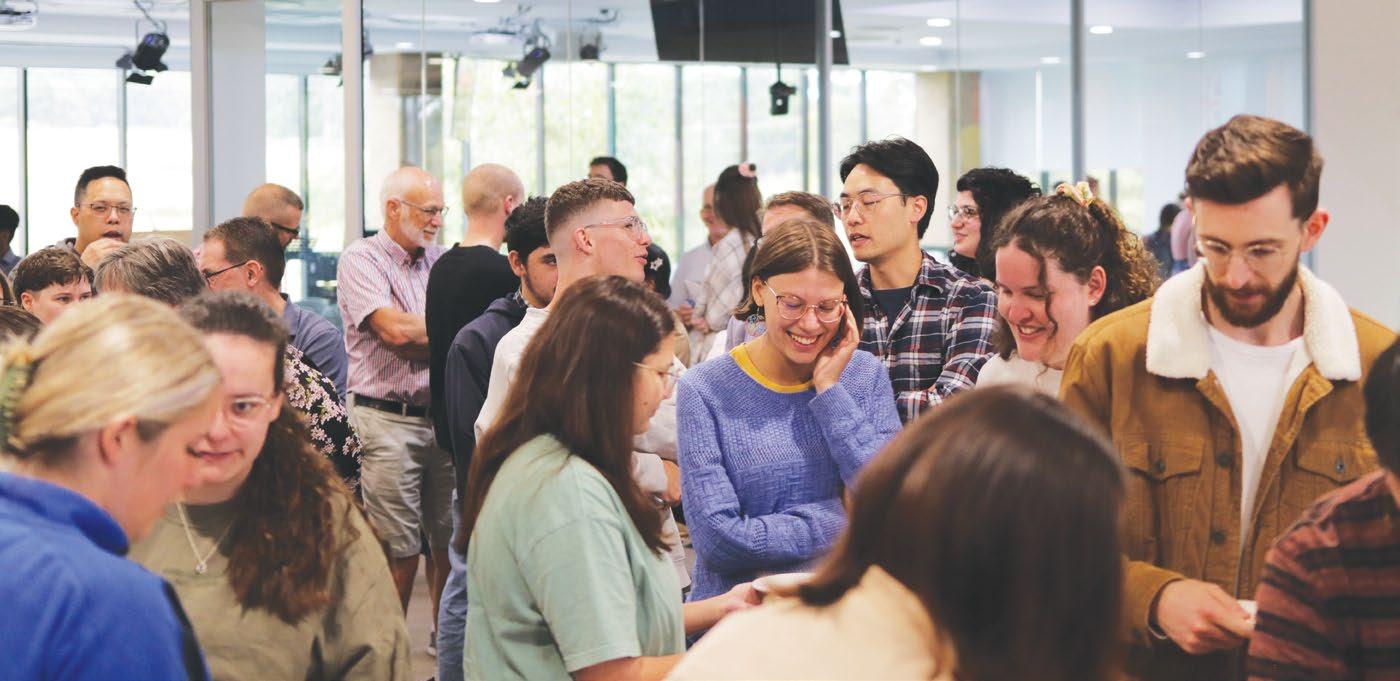
Student Services
Our team has been thrIlled to witness an increase in enrolments, especially in the Initial Teacher Education (ITE) courses at Eastern College Australia (ECA). Our Certificate IV in Christian Ministry and Theology has attracted a wide enrolment base, serving as a practical entry pathway for further study and offering a flexible option to build strong foundations. We hold this course dear to our hearts, for many students enter the college in this Certificate, only to progress to degrees and beyond. Indeed our Dean of Students, Daisy Barnard, first came to MST with a similar Certificate IV enrolment, and progressed to a degree herself. So we are excited to create this foundation to ready many students for future study. We are immensely proud to be offering an exciting new course, the Master of Youth Mental Health and Wellbeing at ECA, which has attracted a lot of interest as it is the only one of its kind in Australia, bridging faith, mental health and wellbeing.
been noting a post-COVID flourishing amongst the college in campus-based Chapel services, prayer meetings, and meals together part of the regular rhythm. Our theme of the year, Matters of the Heart, has begun with treasured messages and gatherings week by week. It is a highlight of college life to gather in praise, reflection and worship in the Chapel. Morning tea fellowship time follows Chapel before students return to classes.
“WE ARE EXCITED TO CREATE THIS FOUNDATION TO READY MANY STUDENTS FOR FUTURE STUDY”
We had staff changes late last year in the Student Services, with Lachlan Perry finishing his employment to explore new professional domain alongside entering married life. Diane Naidoo, a former graduate of MST, has joined us to serve as ‘Student Services Officer to MST-ECA and offer student support by way of Pastoral Care to our students. It is a blessing to see Diane connecting with students and assisting them this year. We wish Lachlan and Diane God’s blessings in their respective new chapters.
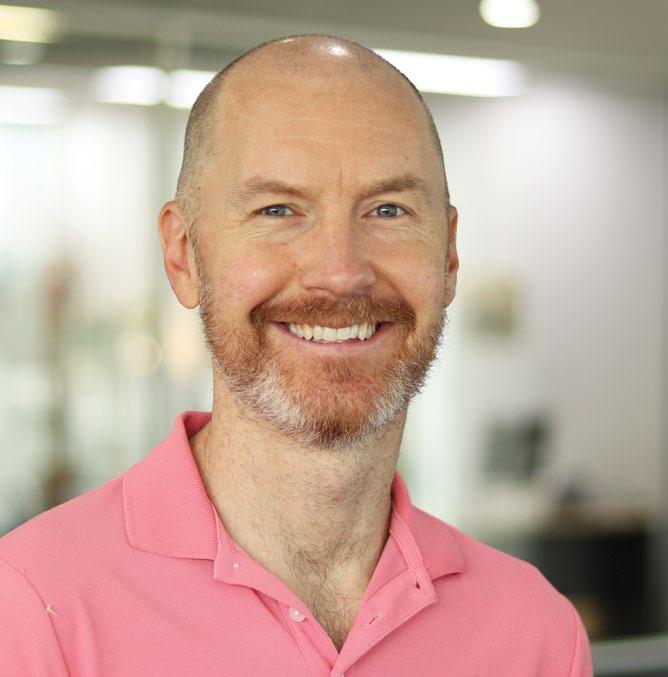
Counselling Faculty
The counsellIng faculty at Eastern College Australia (ECA) is delighted to implement some changes this year.
Our new Counselling Program Co-ordinator, Chad Loftis has recently returned with his family from his mission work serving with SIM Australia at The Well International, in Chiang Mai, Thailand. Chad counselled missionaries and their children from all over Asia, plus much more. He has a Master of Narrative Therapy.
Julie is supporting the counselling program and working towards semi-retirement towards the close of 2024, to give more time to writing her book and other writing projects.
Plus, Candy Daniels continues to support the counselling program on a casual basis, teaching counselling on Mondays at the college. Candy runs her own private counselling service, taking on some of our students for placements, and is well respected in the counselling and chaplaincy professional bodies. She originally graduated from our college (when it was Tabor) a couple of decades ago.
The Student Services team have
We are progressing into the year with a flourish, all enjoying the invaluable contributions of our expanded team.
Dr Ju L ie m orsi LL o is the
Counselling Co-ordinator for Eastern College Australia.
20 On Campus
Daisy Barnar D is the Dean of Students for MST-ECA.
CHAD LOFTIS, NEW COUNSELLING PROGRAM CO-ORDINATOR
MORNING TEA AFTER CHAPEL
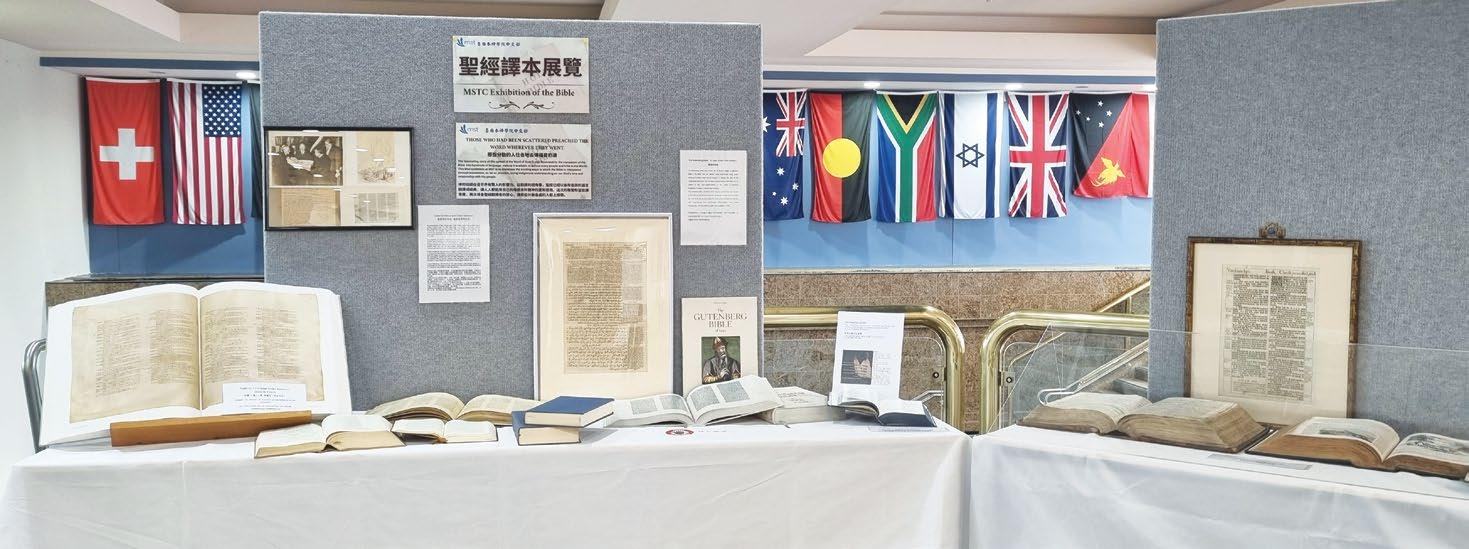
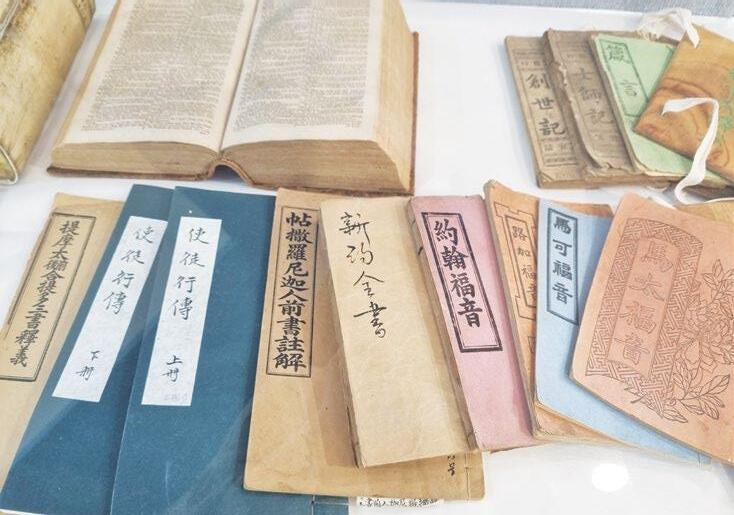
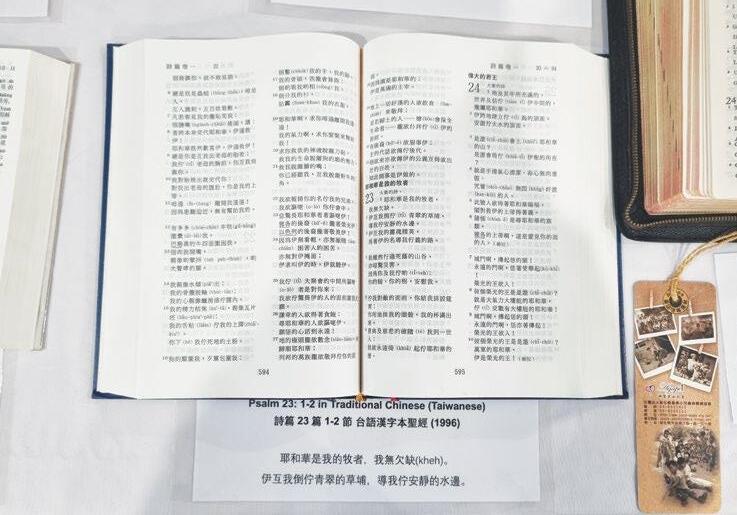

Cen T re for T he sT u D y of
Chinese Christianity
Bible Exhibition
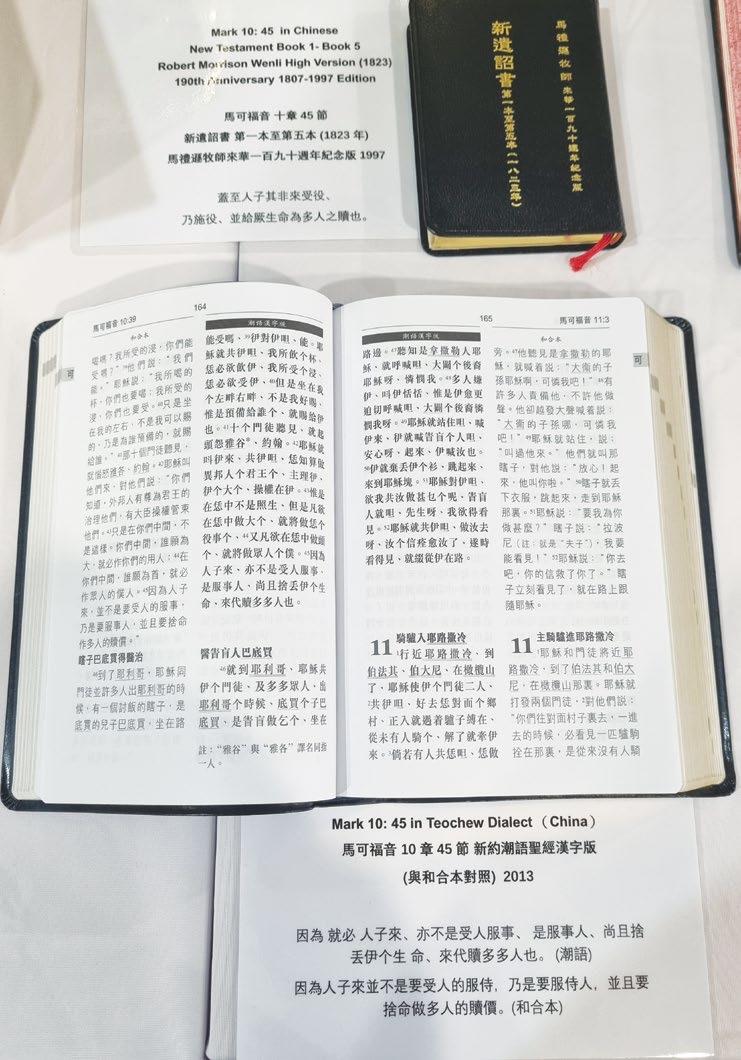
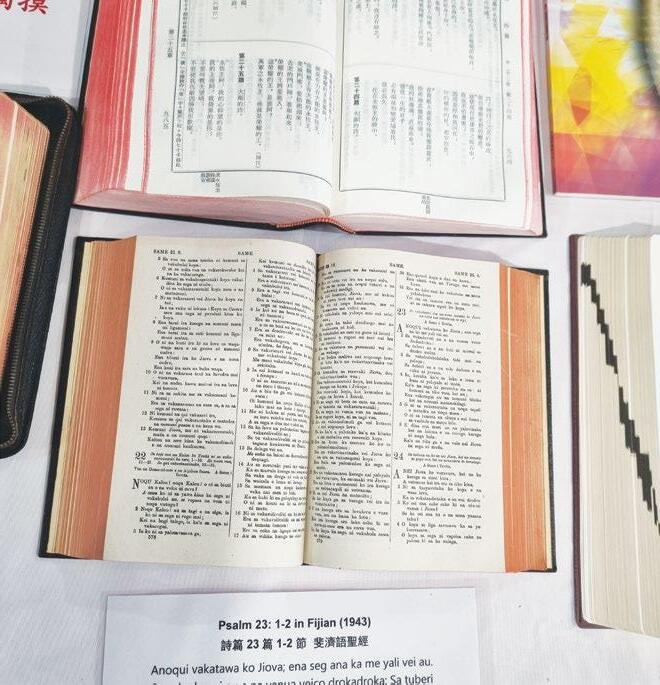
Cscc has a wonderful task of introducing different aspects of the Christian faith to a very vibrant Chinese Church Community in Australia. The Bible exhibition in October last year is but one event in the schedule of CSCC. During the Open Day for Melbourne School of Theology-Chinese (MSTC), Dr Justin Tan had an opportunity to present a lecture on the influence of biblical and theological interpretation in the history of the Chinese Church. He concentrated on the Xi’an Stele, which inscribed the history and theology of Christianity in the Tang Dynasty about 1000 years ago. Along with the lecture, CSCC organised a Bible Exhibition from various periods of Christian History, from the Gutenberg Version to the present. With the assistance of Wycliffe
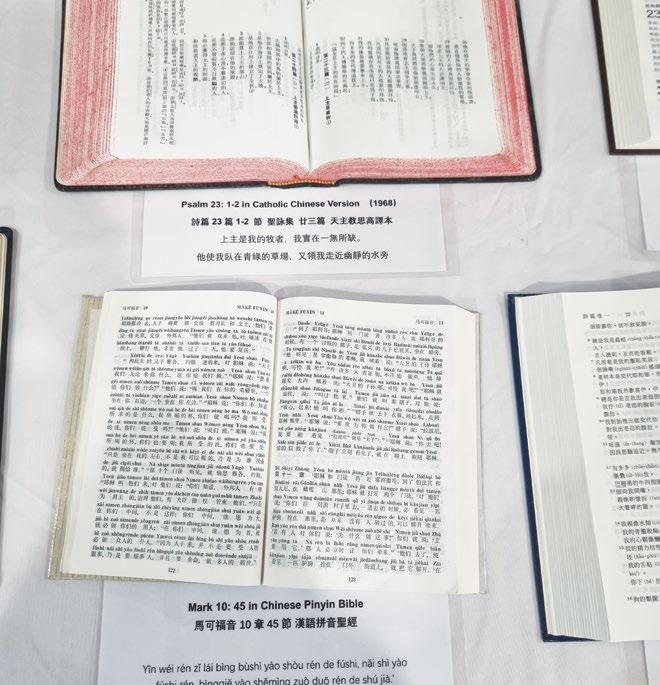
Bible Translator’s library and some private collections, at least 40 versions of the Bible in different languages were exhibited. It was a good time to reflect and wonder at how God’s Word is shared abroad, and to see His heart for all to be able to hear His Word in their own tongue.
“AT LEAST 40 VERSIONS OF THE BIBLE IN DIFFERENT LANGUAGES WERE EXHIBITED”
CSCC is a research centre under MSTC. It has become a vital part of the ministry to the Chinese Christian Community. The three main areas of interest are: research and writing on topics relevant to Christian faith; research on the history of Chinese Christianity in Australia; lectures on history and biblical interpretation in the Chinese Context. It has been a fruitful time engaging in these areas and we look forward to the year to come.
21
r ev Dr Jus T in Tan is the Director for Centre for the Study of Chinese Christianity.
SOME VERSIONS OF THE BIBLE ON DISPLAY AT THE BIBLE EXHIBITION HELD AT MST IN OCTOBER 2023
Farewells
Two dEarly valuEd, long-sErving Melbourne School of Theology (MST) Faculty members retired at the end of 2023. Dr Greg Forbes and Dr Jude Long each contributed, led and shaped our college community for many years. In interviews with Ambassador, each reflect on their time and roles at MST.
WIth a background In the Public Service, Dr Greg Forbes enrolled as a student at Bible College of Victoria (BCV) in 1987 for a part time, six-year Bachelor course, believing he might enter a role as a Pastor later on. A love for research and theology was borne. As he was entering his Masters, Greg was approached to assist teaching Greek. Within another two years Greg had progressed to having full responsibility of the unit and was delivering theology for the college in Ballarat and Bendigo. Doors opened and more opportunity, as he progressed through his studies, to teach and lead within the college community arose.
“Before I was a Christian,” Greg says, “I couldn’t speak in public. Not at all. This was an obvious gift from God. I had confidence in my knowledge of the content and never felt out of my depth.” However the rise and changes of technology were ongoing challenges to Greg. Despite those challenges, Greg continued to cherish educa tion delivery and his engagement in research. “I see myself primarily as a teacher, who happens to do research in his spare time.”
and by Paul, was really enjoyable, and fun to explore.”
In his teaching, Greg reflects on ways that he learnt from his students. “Once I had been teaching on wealth and possessions from the book of Acts. Incidentally my wife and I were contemplating a significant financial commitment at the time. But two of the essays I marked had such an impact upon me, that I was shaped and allowed the work the students had done to influence my decision with my wife. I never said who it was, but I shared with my class that I was personally shaped, and had learnt from the students. They were amazed, but this is how God works.”
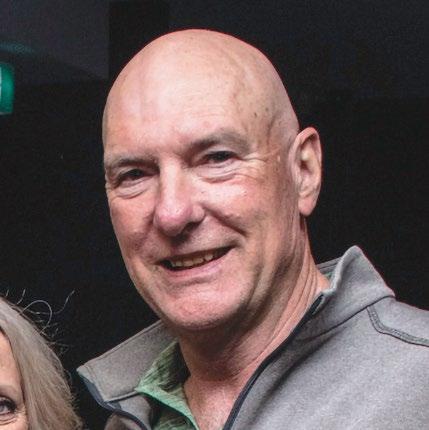
Some of Greg’s most memorable research was alongside (then) colleague Dr Scott Harrower on women in LukeActs (Raised from Obscurity: A Narratival and Theological Study of the Characterisation of Women in Luke-Acts), Pickwick Publications, 2015). “Seeing how women were elevated well beyond the social norms and customs, by Jesus
asking ceaselessly what she herself can learn from The Lord as she teaches.
Noting the “importance of transformation in a person (in their walk with Jesus)”, Jude has sought to see spiritual growth in students before she measures academic development in her students. “This spiritual growth has always been my priority in teaching.” For this reason, fostering strong relationships between students was a personal teaching approach Jude took. “Anchoring relationships to celebrate history and learn from each other foremost can make the learning increase, and a Christlike nature emerges in the classroom.”

Greg looks forward to a newly contracted project writing a scholarly devotional commentary on 1 and 2 Peter and Jude, with the intention to produce something “meatier than piecemeal” in a devotional. “And golf,” Greg says, “I plan to play a lot of golf.”
LIke greg, dr Jude long began when MST was operating as BCV, in 1994. With breaks along the way, Jude recalls the cultural changes from being a residential college in Victoria’s outer East, to the Wantirna campus it is now. With a doctorate focus upon “how to teach theology for personal transformation,” Jude has been regularly questioning pedagogies and
Perhaps her interest in transformation is why prayer has been a career highlight for Jude. “I always say that nobody can leave my office without receiving some prayer”, she says, “but the opportunity to pray with students and colleagues alike has been a true blessing for me.” Jude successfully instigated a practice amongst college staff and faculty of regular small-group prayer meetings known on the calendar as Prayer Triplets.
Exploring, enquiring, teaching and engaging in Australian history, identity and future growth are areas of deep passion to Jude. Teaching ‘A history of Christianity in Australia’ and personal experience teaching in Indigenous communities combine to inform this special interest. “It’s not likely to be an interest area I can separate from,” Jude says of her future.
Clearly Greg and Jude are both intending to contribute in various ways to the Christian academic community, despite their respective teaching roles finishing. We are truly thankful for the wisdom, love and commitment they have each offered us, and pray blessings over their futures in every way.
22
GREGFORBES
JUDELONG
mst.edu.au/library

Library Tour
Did you know that the library conduct tours? We encourage students to sign up at mst.edu.au/library-tour.
Book Sale
Our book sale also operates during library opening hours.
Library opening hours
Semester 1 2024 (during semester):
Monday: 10am – 6pm
Tuesday: 10am – 9pm
Wednesday: 10am – 9pm
Thursday: 10am – 9pm
Friday: 9am – 5pm
Saturday: 9am – 1:30pm
Staff Updates
At the end of 2023, we farewelled Rolien Eloff who finished her role as a Library Assistant. Rolien was a valued member of the library team, and made important contributions to the library including orchestrating library signage, running library tours and assisting with quality improvement within the library.
Emma Smith has joined the library team, working on Wednesday and Thursday nights. Emma worked in a previous library role at Waverley Christian College and completed a Diploma in Library Science in 2020. We warmly welcome Emma to the team.
23
THREE GENERATIONS
A f A m I l Y T r EE b EA r ING m ANY fru ITS
OF MISSION AND ALUMNI

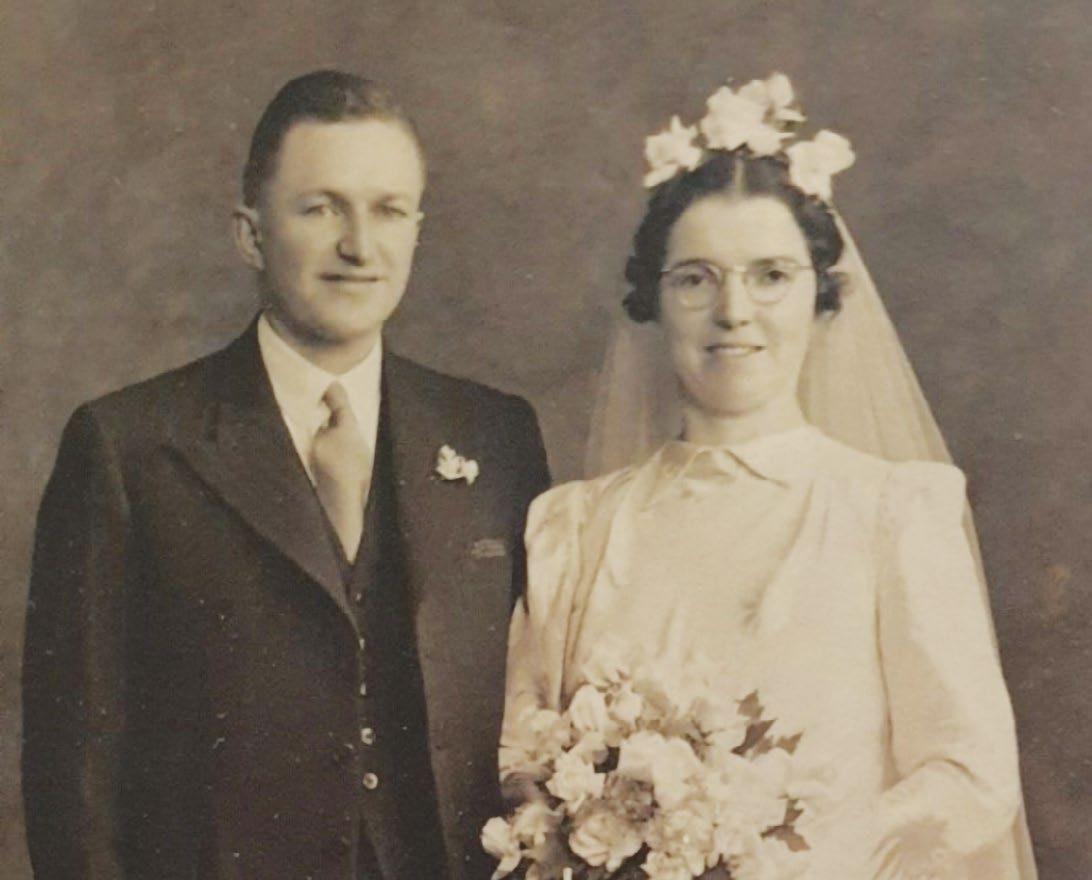
IN1928, australIa faced fInancial depression and strikes and labour disharmony increased dramatically across the nation. The Royal Flying Doctor Service took its first flight, and twenty-yearold Arthur Pocklington attended the Melbourne Bible Institute (MBI). In the female quarters of the same college, Edna Myrtle Smartt was also a student. The two were unfamiliar to each other by virtue of gender separation at the time. Yet they were unwittingly united in their dedicated passion for missions. Some years later, one of their mutual MBI lecturers placed their individual pictures on either side of his
Bible, committed to praying for them as they each launched into adulthood and the global mission field.
“THEY WERE
UNWITTINGLY UNITED IN THEIR DEDICATED PASSION FOR MISSIONS”
Edna travelled with Sudan Interior Mission (SIM) to Sudan and later Ethiopia. Arthur joined China Inland Mission (CIM—now Overseas Missionary FellowshipOMF) and went to China. Almost a decade passed as they served The Lord on the field overseas, never knowing that their images were side by side in a stalwartly praying man’s Bible back home. Illness affected them incidentally at approximately the same time, with Edna returning to Australia around 1940 with Malaria. Arthur caught life-threatening Typhoid Fever
and was unable to walk until intercessory hands were layed upon him, and he likewise returned home. Upon their recoveries, Arthur was preaching one day in a community congregation when Edna was brought in, via an associate, to share her testimony of years in faithful overseas service. They recognised each other from their college days, this time without divisions to keep them from making acquaintance. It would not have taken long to see each other’s passion for service and indeed, passion for the Lord Jesus Christ. They soon married, beginning a family heritage of mission. With three children, (Robin, John and Liz), Arthur and Edna continued to serve and live out the Gospel calling. Arthur was the initial Organising Secretary of the Belgrave Heights Convention Centre, known affectionately there as
24
WEDDING DAY 24 MAY 1941
EDNA MYRTLE SMARTT, AND ARTHUR POCKLINGTON ( THESE WERE THE PICTURES KEPT IN THE SAME BIBLE OF THEIR LECTURER )
‘AP’, for many decades. Their children knew life in service intimately, growing up as “PK’s” or Pastor’s Kids.
Not surprisingly, going to MBI was a natural choice for Robin in 1964, where he met Janice (Jan). When Jan had received Christ at 14 years old, she knew she would go into missions, and committed to serving Him as a nurse. But to do His work, she needed more than medical
“SHE KNEW SHE WOULD GO INTO MISSIONS, AND COMMITTED TO SERVING HIM AS A NURSE”
qualifications alone, and had enrolled at MBI in 1964. The two were platonic associates through their college days. After graduating, Jan returned to nursing, while Robin continued studying for two more years. Upon his graduation, Robin joined Open Air Campaigners (OAC) as a staff evangelist. Through an OAC outreach at King Island, Robin saw God bring a large group of young women to Christ. Who
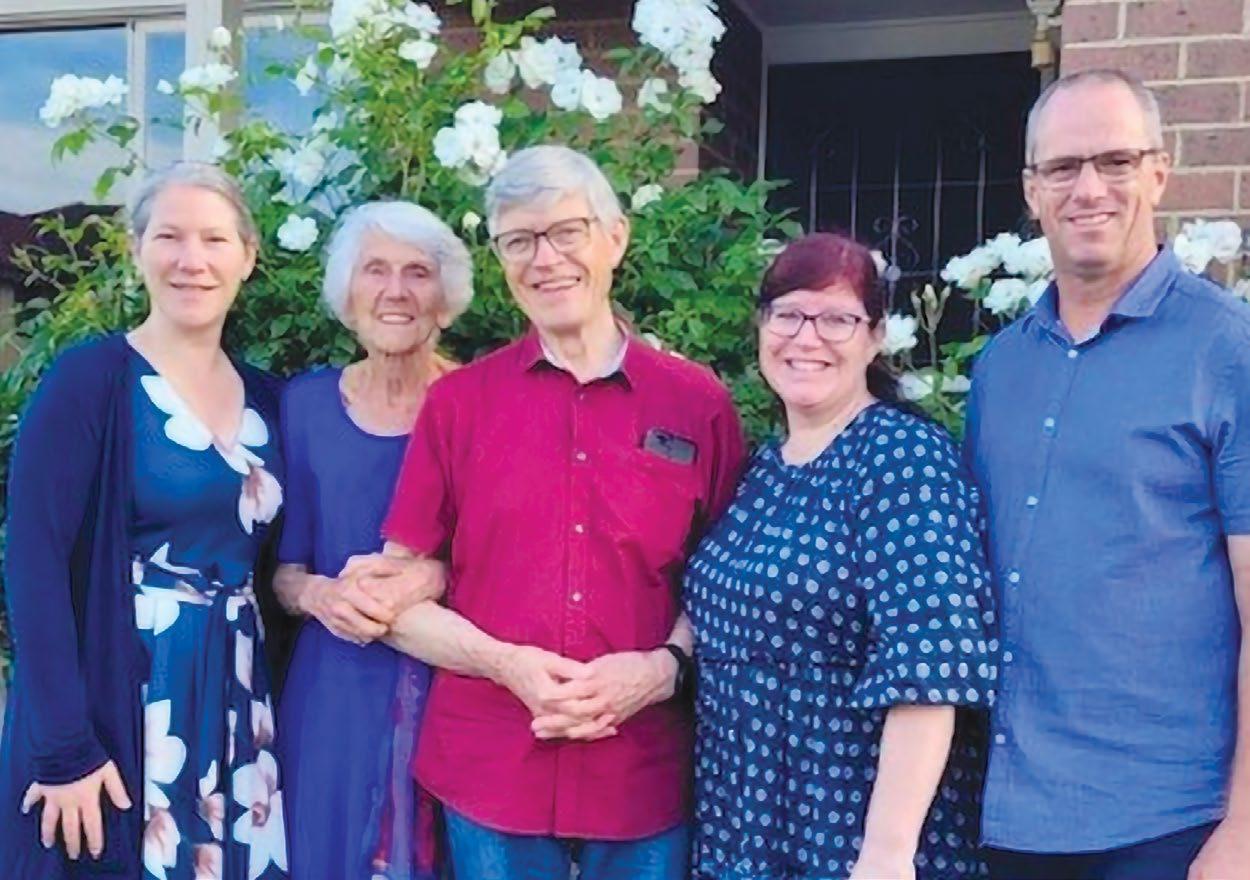
and working with children in tow on the mission field locally and globally, Robin and Jan’s daughters Tina and Kate became the next generation of Pocklington “PK’s.” The family lived on the international mission field, spending 8.5 years in the Philippines.
Kate Pocklington, like her grandparents, and her parents, also attended the college, by then called Bible College of Victoria (BCV). She earned a Doctorate in Intercultural Studies, two Master of Arts (Biblical Studies and Intercultural Studies) a Bachelor’s Degree in Theology and a Diploma of Missiology. Kate continues to serve with the dedicated fervor of her family, through Melbourne School of Theology (MST) as a lecturer in Missional Studies, plus time locally and globally on the mission field, serving with Pioneers.
could disciple them? He swiftly wrote to his former college associate, Jan, to see these new believers discipled well. This letter, incidentally, marked the beginning of penned friendship and they began exchanging letters. Just as it is written in Psalm 45:2, Robin’s grace and heart for Jesus rendered him most favourably in Jan’s eyes. They married in 1968, becoming the second generation of Pocklingtons to meet through MBI association, and ultimately marry with a full-time focus on mission.
Continuing traditions of serving at the Belgrave Heights Convention
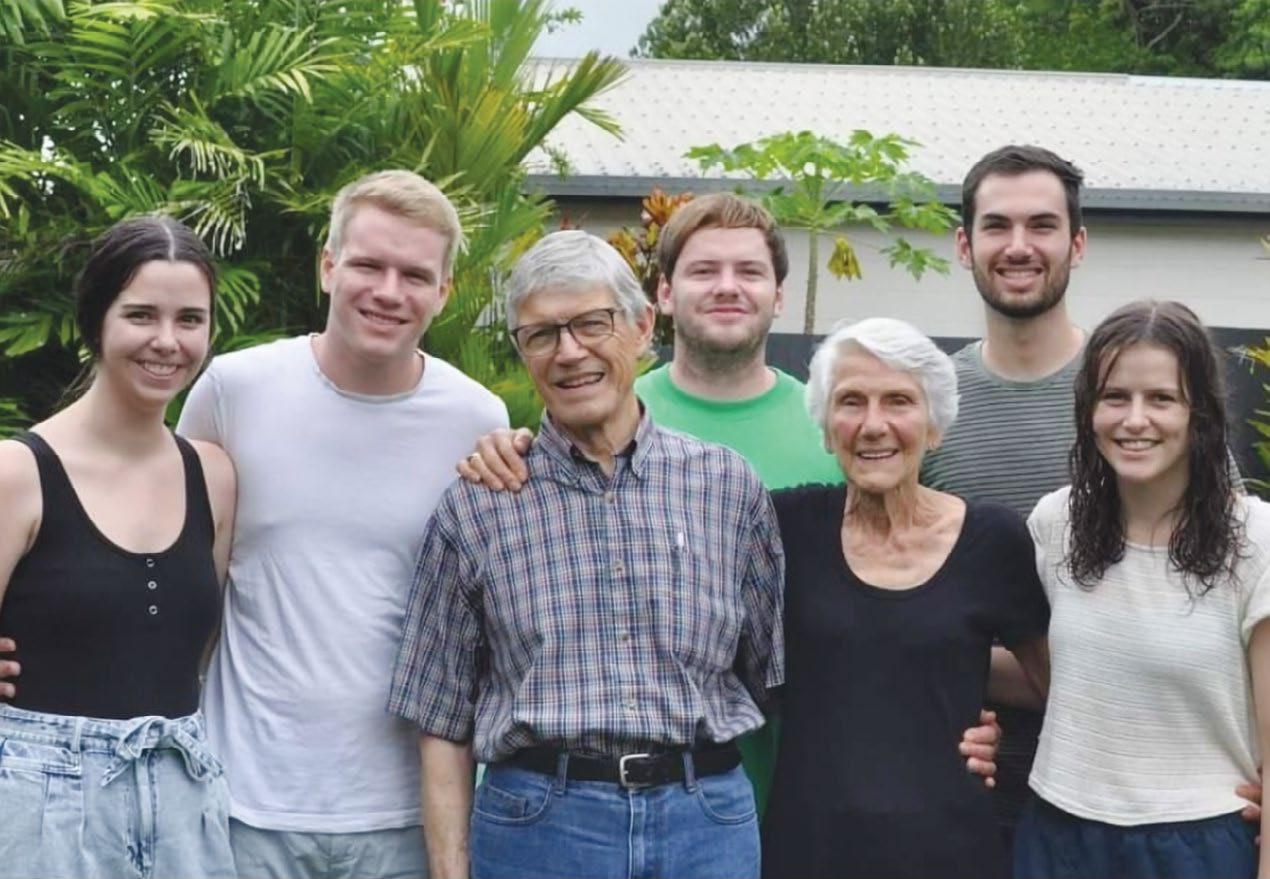
Tina also followed the family to BCV, after completing nursing studies just like her mother. At BCV, Tina met Clint Smith. Realising a shared heart for the gospel, Tina and Clint married in 1996. The two travelled to Papua New Guinea with Mission Aviation Fellowship (MAF), and have three children (Olivia, Ethan and Lachlan). Tina has continued to serve faithfully in community health and Clint within the aviation industry. By God’s grace, their children, now young adults, are grounded in the Word of the Lord and engaged in their church communities. Since 1928 when Arthur and Edna enrolled at the college, the world has seen a great deal. There has been much bloodshed and horror in wars, loss and destruction in earthquakes, tsunamis, floods and fires. Political and financial
unrest brews, boils and simmers in variegations across the globe. But the calling of the Lord is unaverred by this wavering world. The trifold generations of Pocklingtons attending the college to become equipped in mission, and subsequently spending their lives in service, is testimony of the unchanging God we have in changing times. Love that has taken first root in MBI soil has become an evergreen, firm family tree; a heritage and hope for all alumni, and generations to come.
25
KATE, JAN, ROBIN, TINA,CLINT ( ALL MBI AND BCV GRADUATES )
KATLYN, MARRIED TO ETHAN SMITH, NEXT TO HER. ROBIN, LACHIE SMITH, JAN, DANIEL KENNEDY, MARRIED TO OLIVIA ( NEE SMITH )
Cornelia Tyrrell
by Tim Meyers
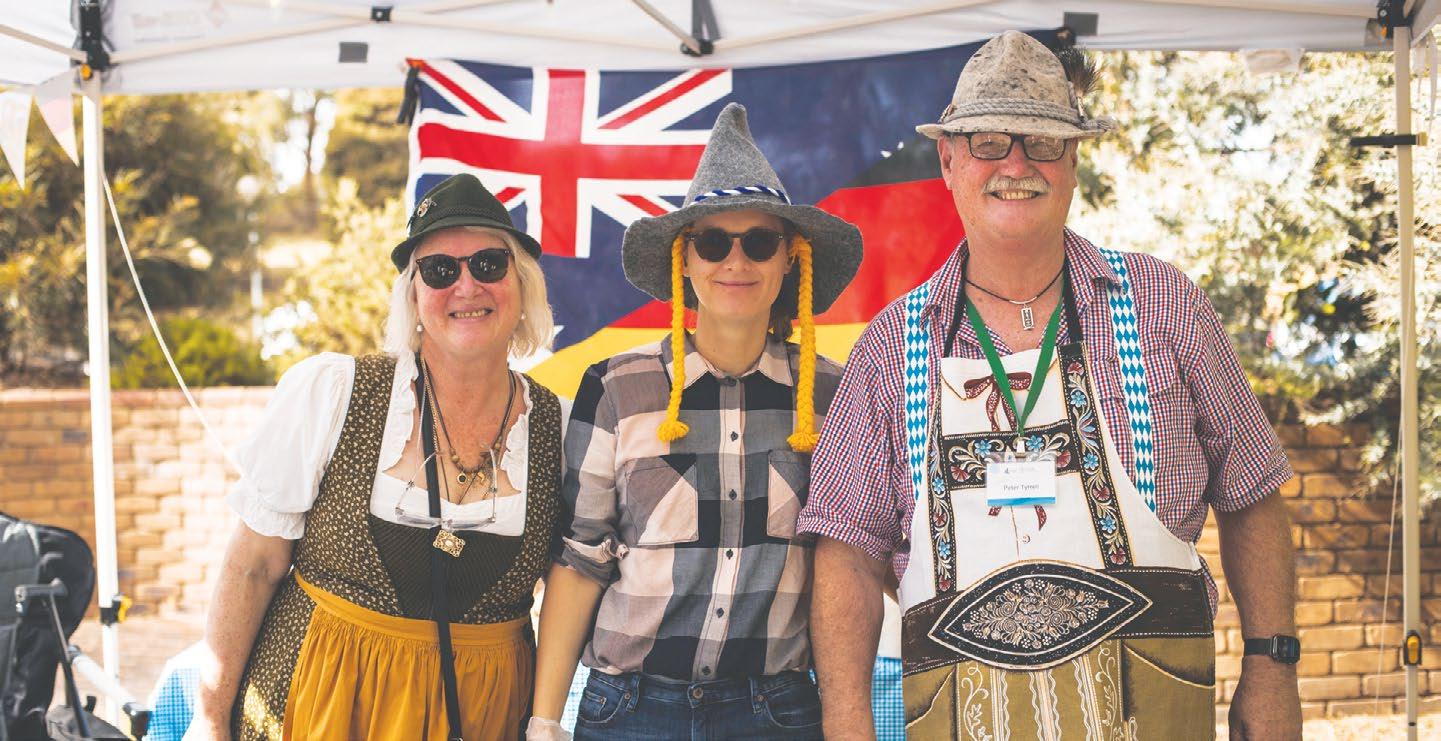
ONtuesday mornIng, february 20th, Cornelia Tyrrell, dearly loved wife of Peter, and mother to Carla, Grace, Eve and Mary, passed away after a three-year battle with illness. Peter served as Vice-Principal, Community and Operations and Special Projects Officer at Melbourne School of Theology (MST) for ten years. Cornelia was a much-loved, familiar face to our entire community.
Later that day, Peter wrote:
“This morning, at 3am, my darling Cornelia passed away from leukaemia. Cornelia was diagnosed in March 2020, with the past 8 months being the most difficult. My darling girl is now at peace and in the arms of the Lord.”
The thanksgiving service was held
at Kilsyth South Baptist Church on 28th March, to a completely packed auditorium and overflow room. It was a profound and moving service, in which Cornelia’s deep faith in Christ, and that of Peter and the family, left a deep impression on all present. Many staff and faculty of MST and Eastern were in attendance, along with hundreds of family, friends and acquaintances. It was an uplifting and nourishing worshipful service and, to many, a deep and precious reminder of what we all know and profess; that we do not grieve as those who have no hope will grieve. (1 Thess 4).
Please continue to pray for Peter and the family, as they continue to process their loss.
Rev Dr Harold Taylor
by Tim Meyers
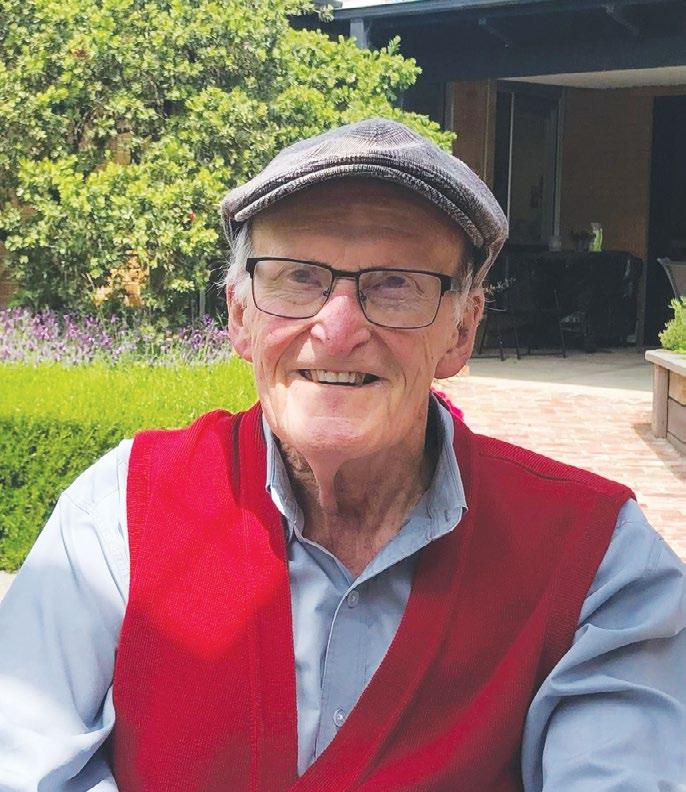
As this issue goes to press, we received news of the death of Rev Dr Harold Taylor on 22nd April 2024.
Harold was on the staff of the Bible College of Victoria, teaching and writing in the areas of mission, pastoral care and counselling. Harold also served as Vice Principal for many years.
We extend our love and prayers for the comfort and peace of Christ, to his wife Barbara, and his children - Jenny, Andrew, Cathy, Paul and their families.
26
Vale
CORNELIA TYRRELL, JENNI BR Ä UTIGAM, PETER TYRRELL
Alumni News

We do send our condolences to the families of all our alumni and staff who have gone to be with the Lord in recent years.
We often hear afterwards of the passing of former students and staff. We do apologise if we have overlooked or inadvertently left out anyone in recent publications.
Bruce Watkinson, Bible College of Victoria Dean of Studies, passed away on 24 October 2022
Rod Grant, Melbourne Bible Institute, 1966-1968, passed away on 8 November 2022
Desley Stewart, passed away on 25 November 2022
Ruth May, Melbourne Bible Institute, late 1960’s, passed away on 18 January 2023
Betty Rowse, Melbourne Bible Institute and Pioneers, passed away on 29 January 2023
Jan Wood, Melbourne Bible Institute, 1967-1968, passed away on 30 January 2023
Margaret Scott Simmons, Melbourne Bible Institute, passed away on 18 March 2023
Malcia Stevens passed away 4 May 2023
Kaye Truscott passed away 5 May 2023
Stewart Rae, Melbourne Bible Institute, 1961-1962, passed away on 24 May 2023
Frank Clarke, Melbourne Bible Institute, 1957-1958, passed away on 29 June 2023
Valmai Hollis, Melbourne Bible Institute, 1960-1961, passed away on 5 July 2023
Don Patterson, Bible College of Victoria, 1980’s, passed away on 5 August 2023
Gail Patterson, Bible College of Victoria, 1980’s, passed away on 4 August 2023
Heather Wilkinson, Bible College of Victoria, 1980’s, passed away on 4 August 2023
Margaret Parkinson, Melbourne Bible Institute, 1960’s, passed away 29 June 2023
Patricia Warner (nee Fordham), Melbourne Bible Institute, 19631964, passed away on 20 July 2023
Bec Featonby, Melbourne School of Theology, passed away on 18 August 2023
Betty Irene Gray, Melbourne Bible Institute, 1957-1958, passed away on 18 August 2023
Sallie & Leon Norworthy, of Melbourne Bible Institute, passed away with 24 hours of each other on the 24th and 25th August in 2023
Lawrence Taylour, Melbourne Bible Institute, 1953-1954, passed away on 8 September 2023
Glenyce Lovett passed away on 16 September 2023
Herbert Eadon, Melbourne Bible Institute, 1953-1954, passed away on 22 September 2023
Gwenneth Winter passed away on 28 September 2023
Ed Dickinson, Melbourne Bible Institute, passed away on 17 October 2023
Helen Hillas, Melbourne Bible Institute, passed away on 4 December 2023
27
RIGHT PAGE, TOP: UNSPLASH SIMON LEE
The Spirit in Romans: Source of Power and Pain for Christians
Speaker: Steve Walton
Professor Steve Walton serves as Senior Research Fellow at Trinity College, Bristol, UK and is known for his research, writing, and teaching on (Luke)Acts. His books include Reading Acts Theologically and Exploring the New Testament, vol. 1 The Gospels and Acts.
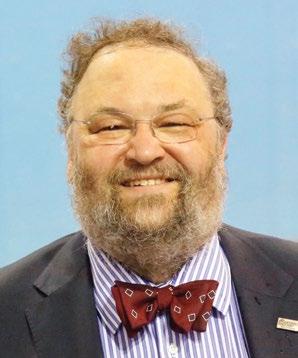

Register: mst.edu.au/paradosis Melbourne School of Theology



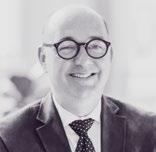

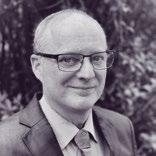



Our open nights are designed to inform and inspire you and to help you make the right decision about your next step.
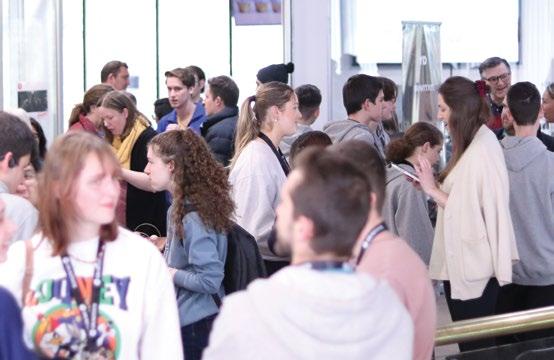
Speaker: Dean Flemming
Dean Flemming is an author and Bible teacher. He is Professor Emeritus of NT and Mission at MidAmerica Nazarene University in Olathe, KS and Professor of NT at the Missional Training Center in Phoenix, AZ, USA. He served for 24 years as a theological educator in the Philippines and Germany.
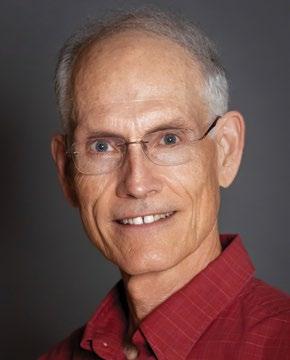
THURSDAY 15 August THURSDAY 4 July 9-10 August 1 July THURSDAY 12 September PUBLIC LECTURE
Semester 2 new student application closing date 22 July Semester 2 Start date Leonard Buck Lecture: Hope, Climate Anxiety, and the Mission of God Open Night MST & EASTERN
Dr David Fergusson
Dr Andrew Brown Dr Jonathan Pennington
Dr Rebekah Earnshaw
Dr Paul Tyson
Tony Rinaudo
Prof Michael Clarke Dr Sarah Wilson
PUBLIC LECTURE
Dr Chris Mulherin













































































































